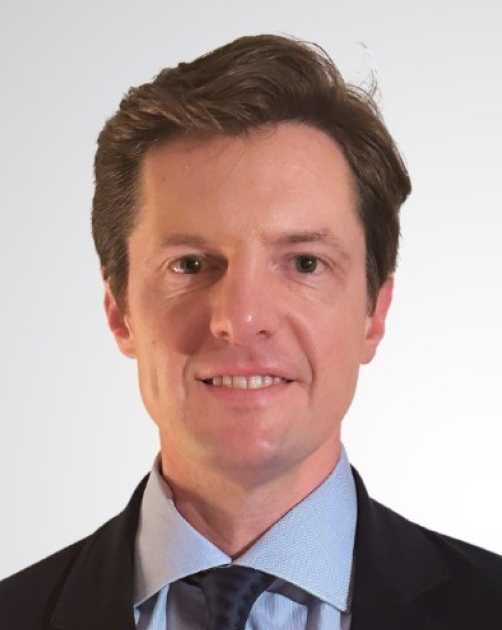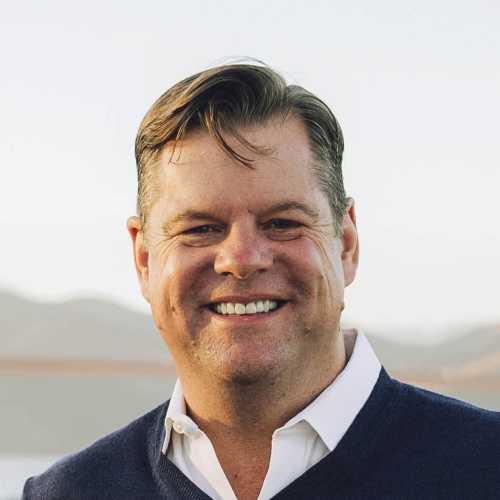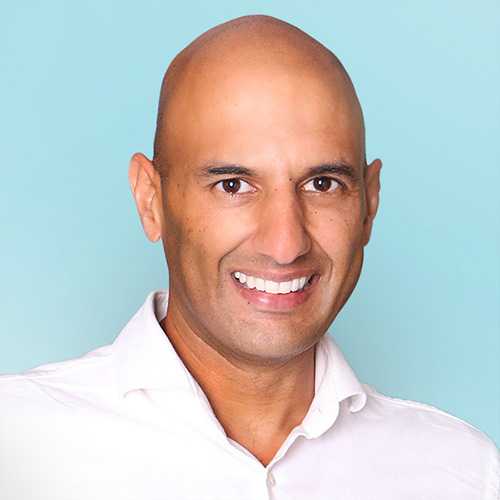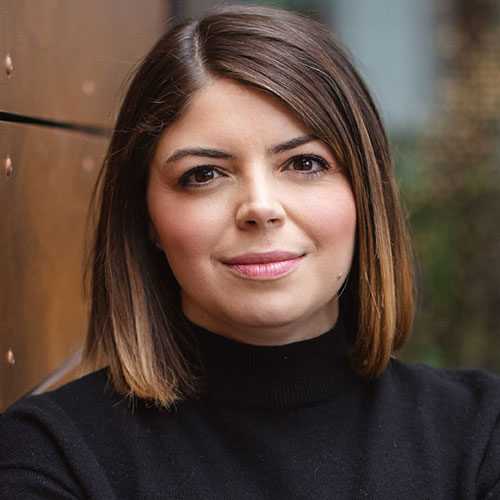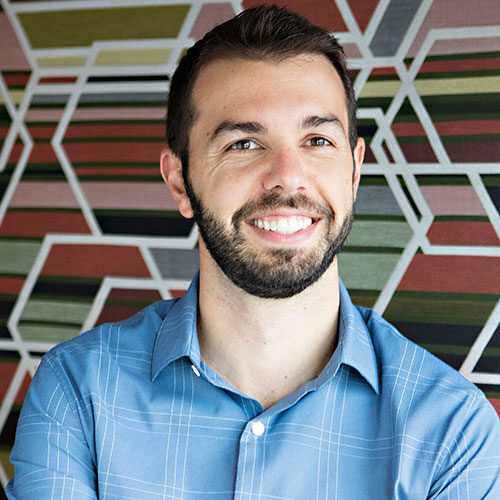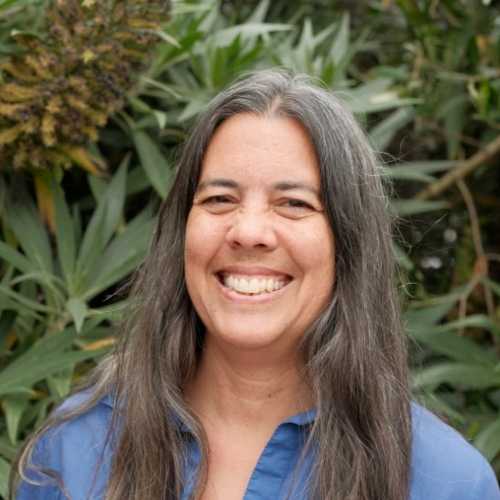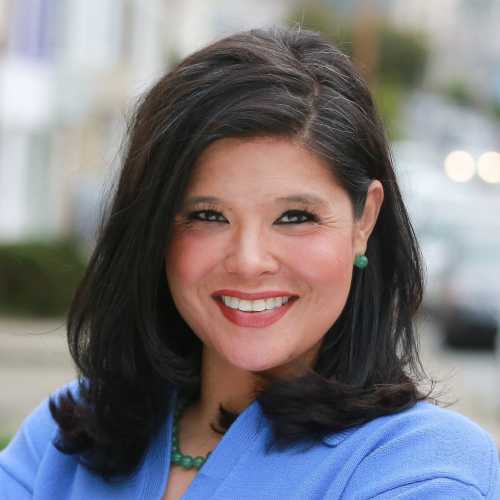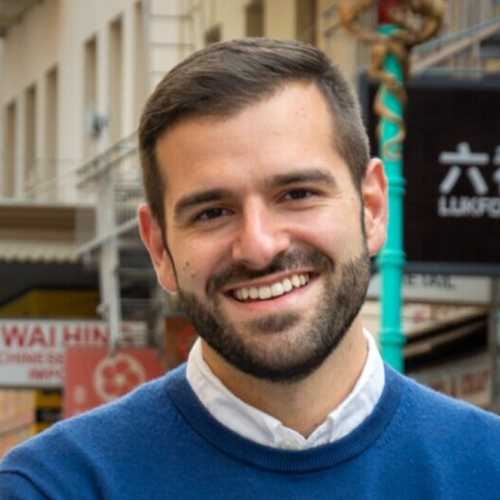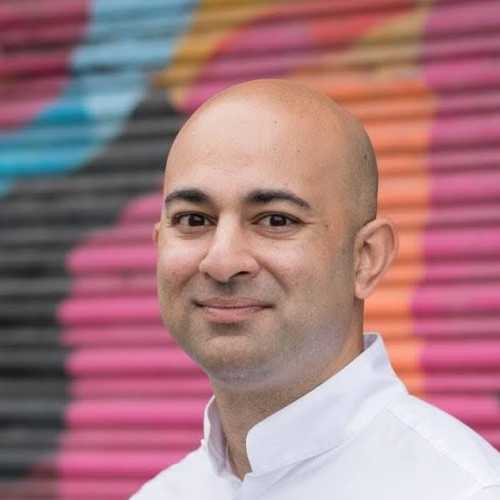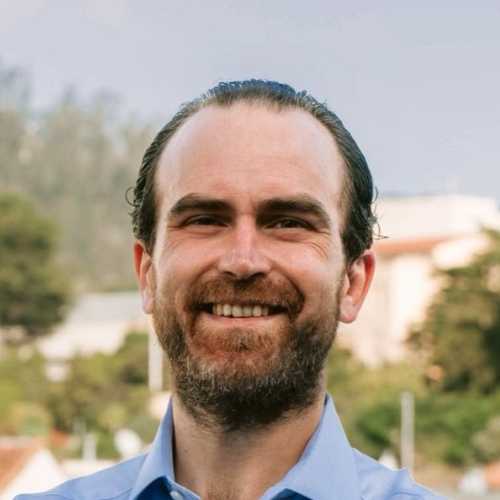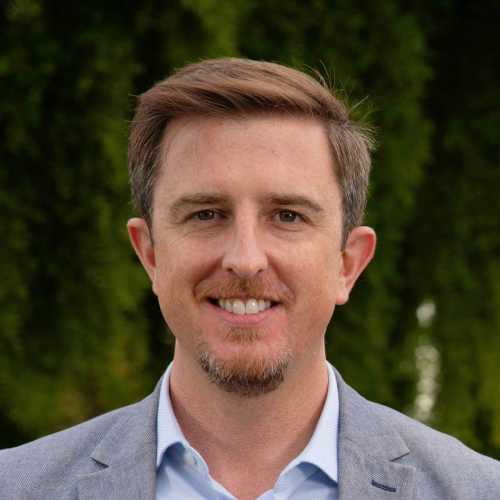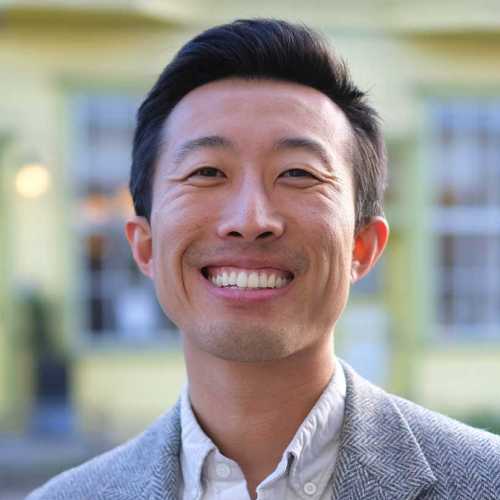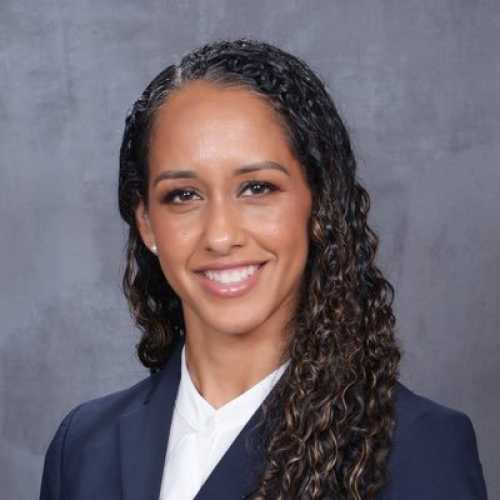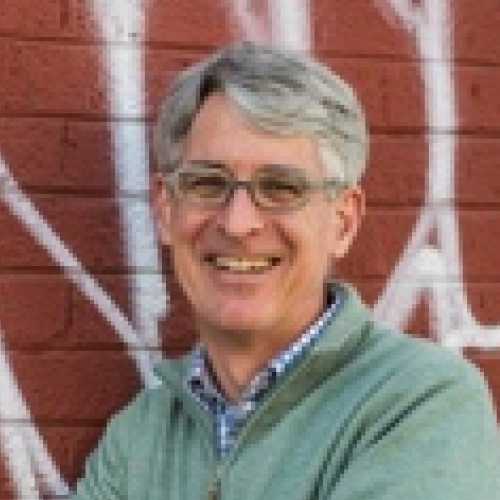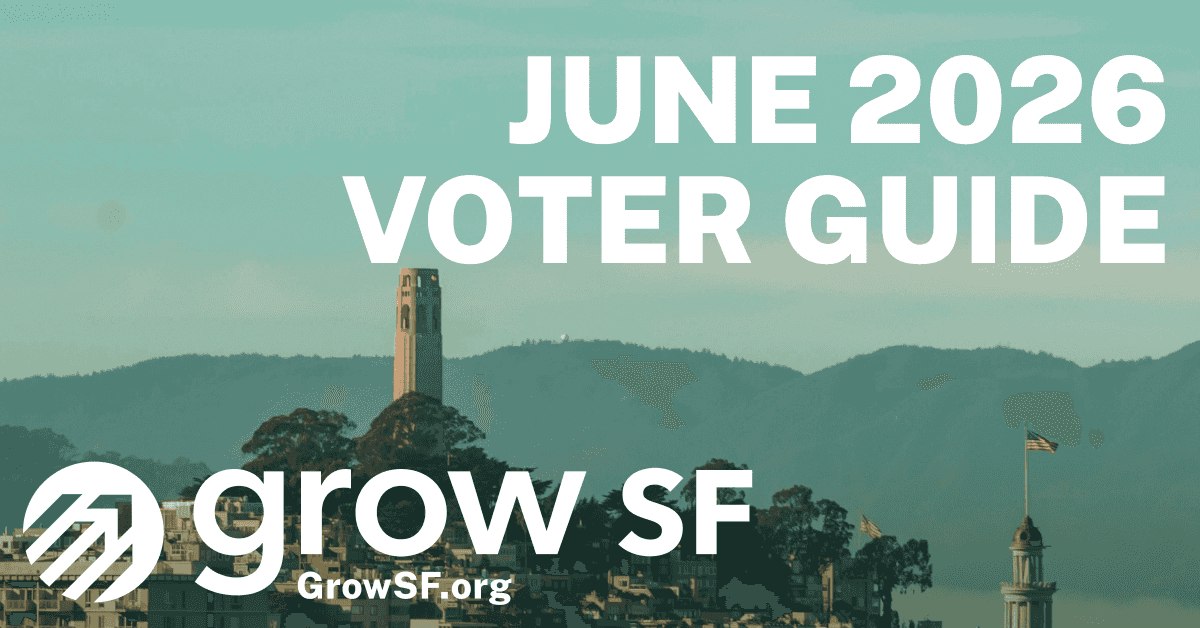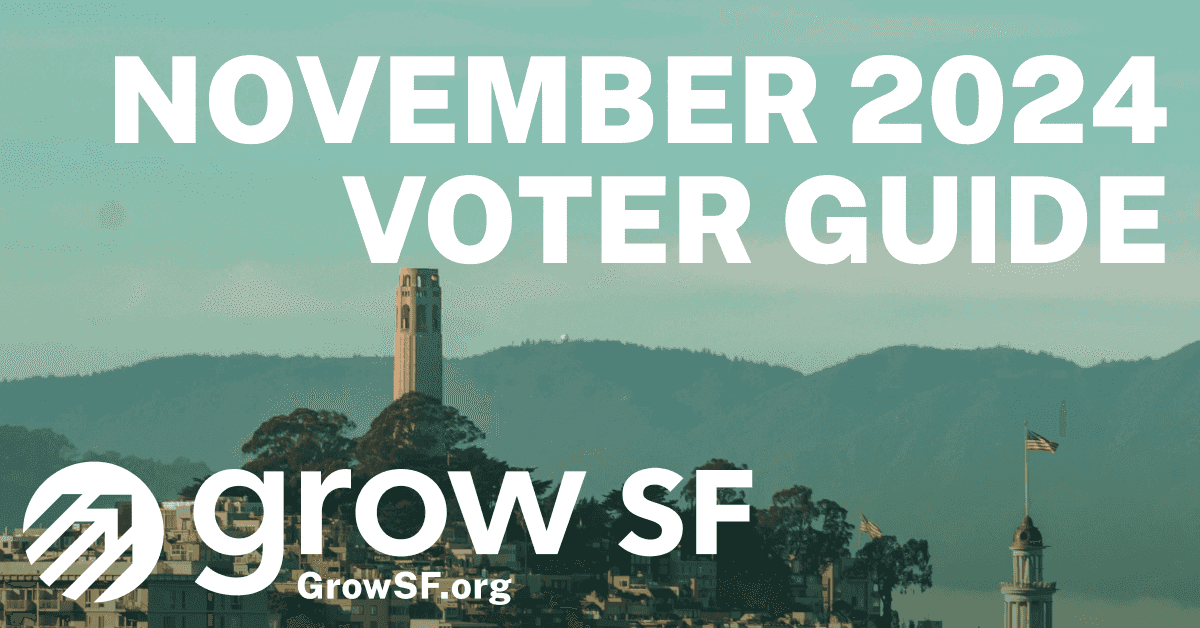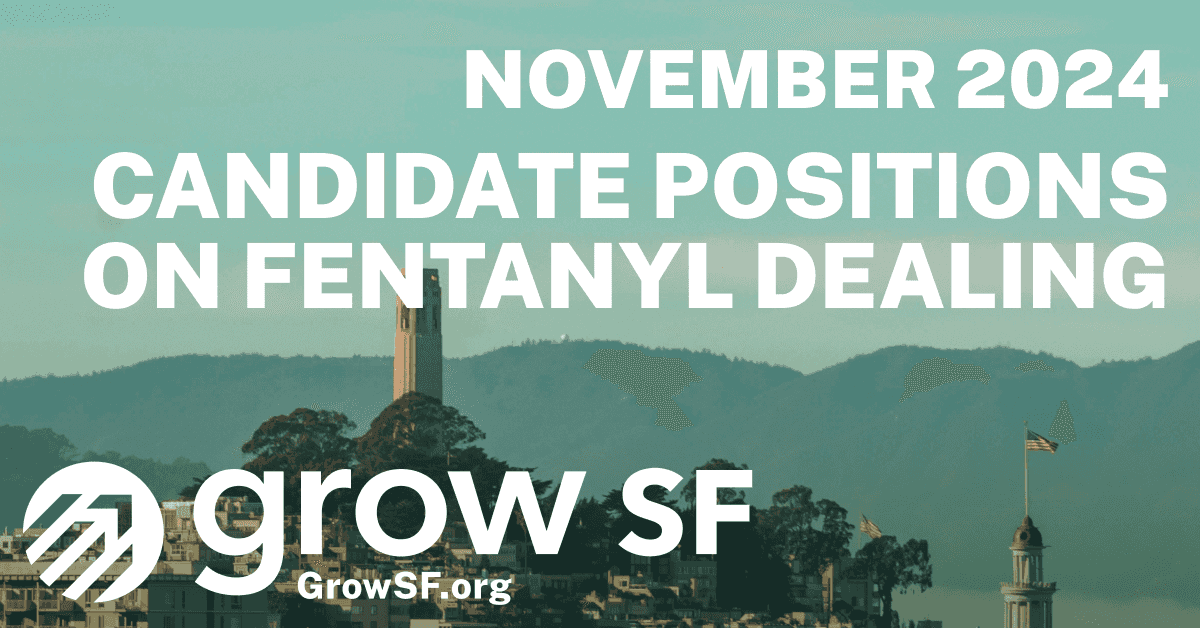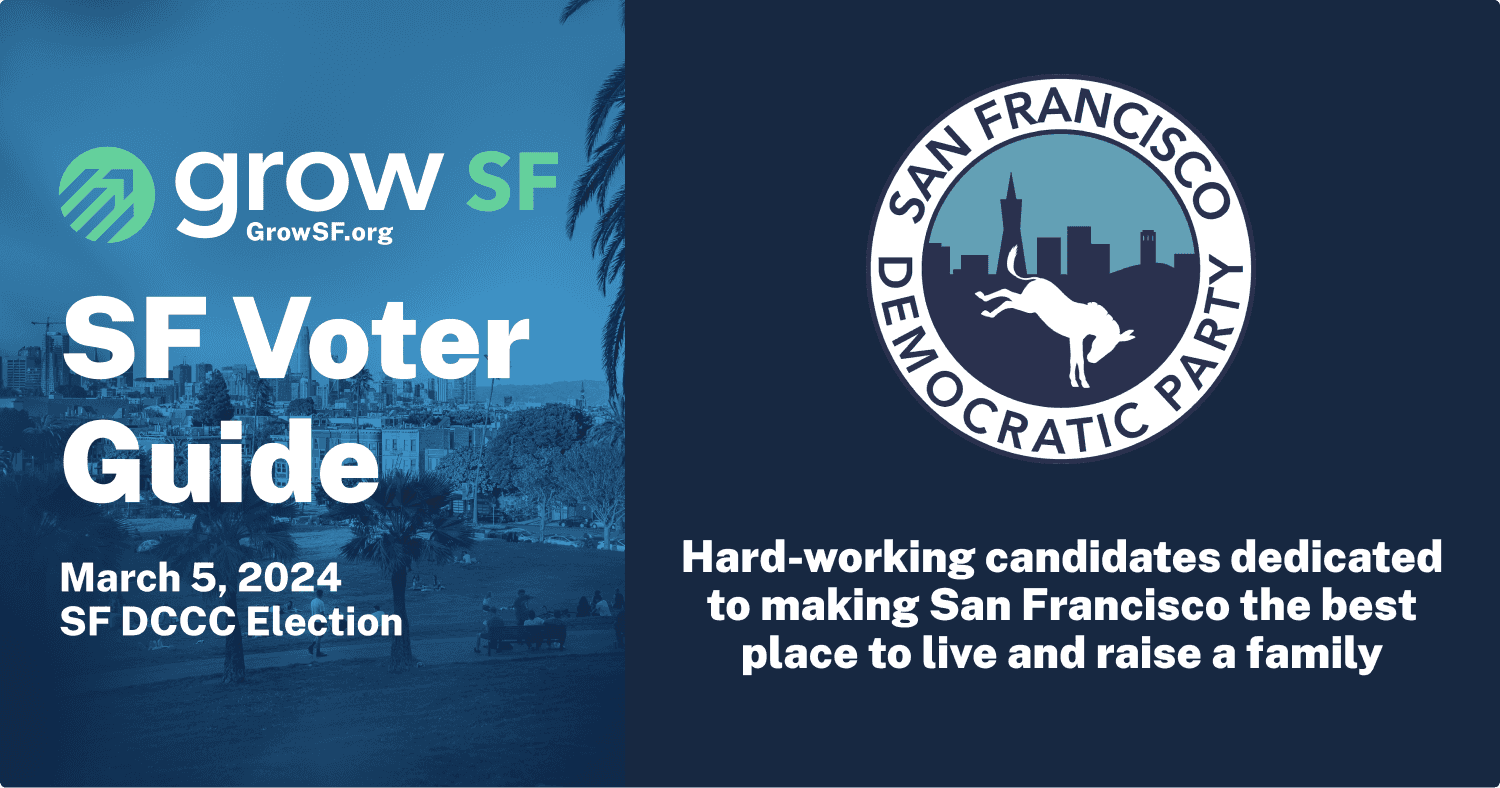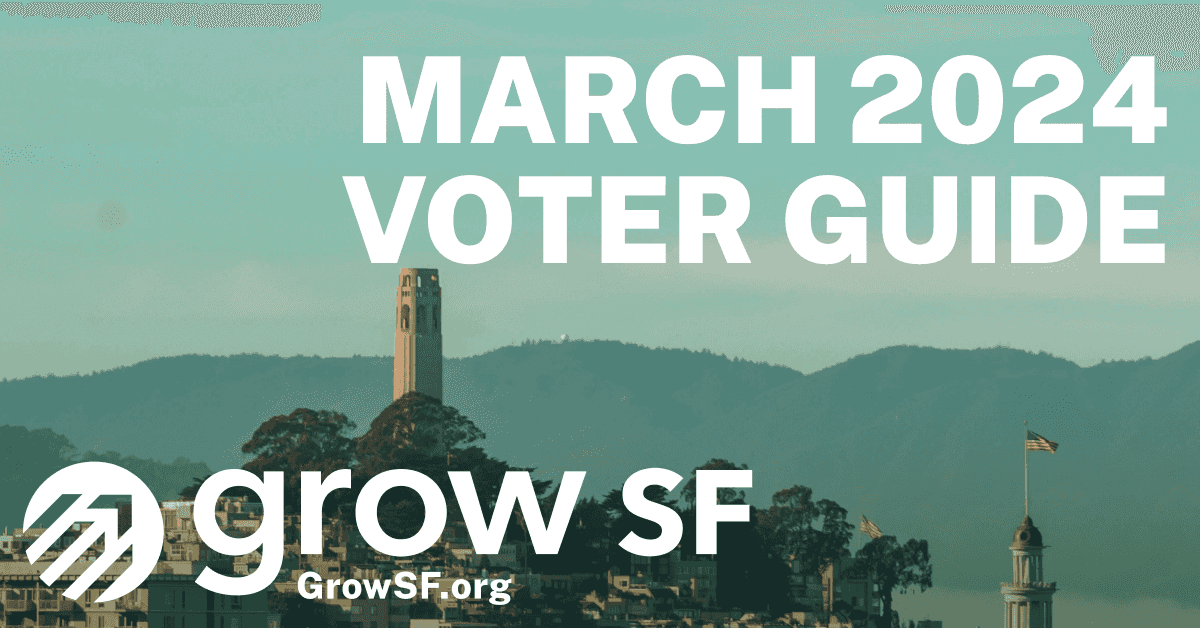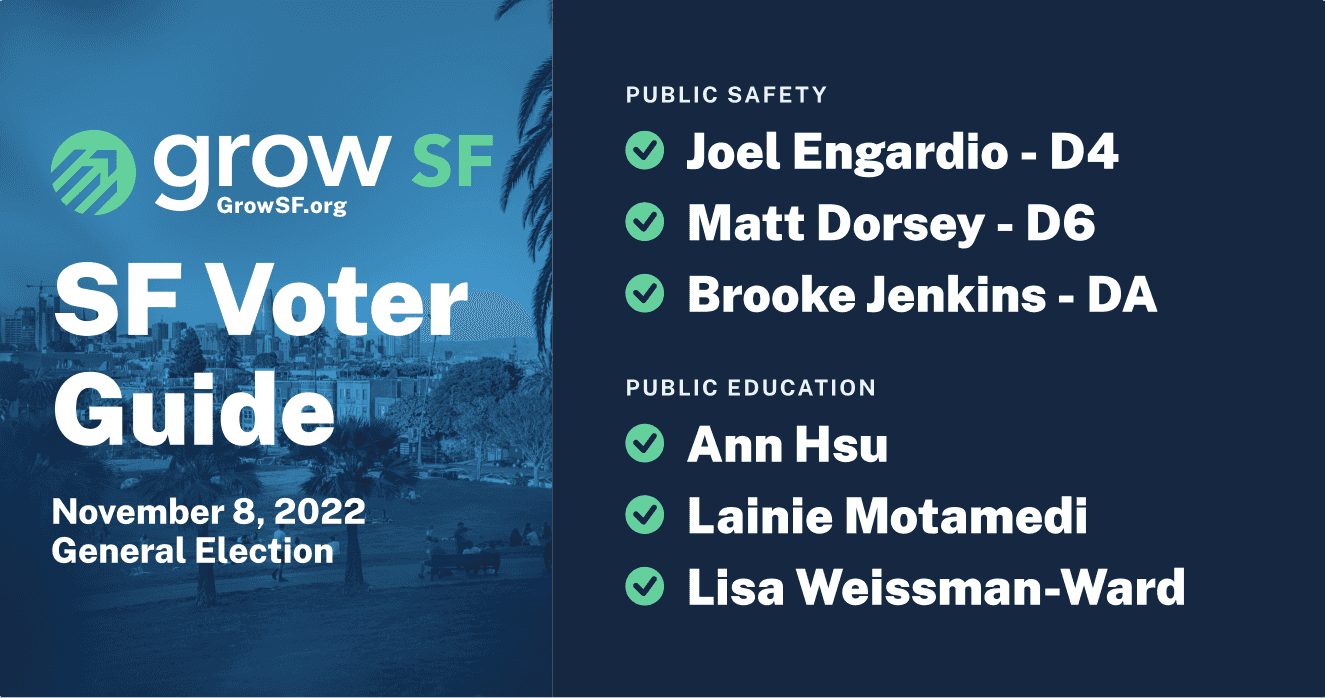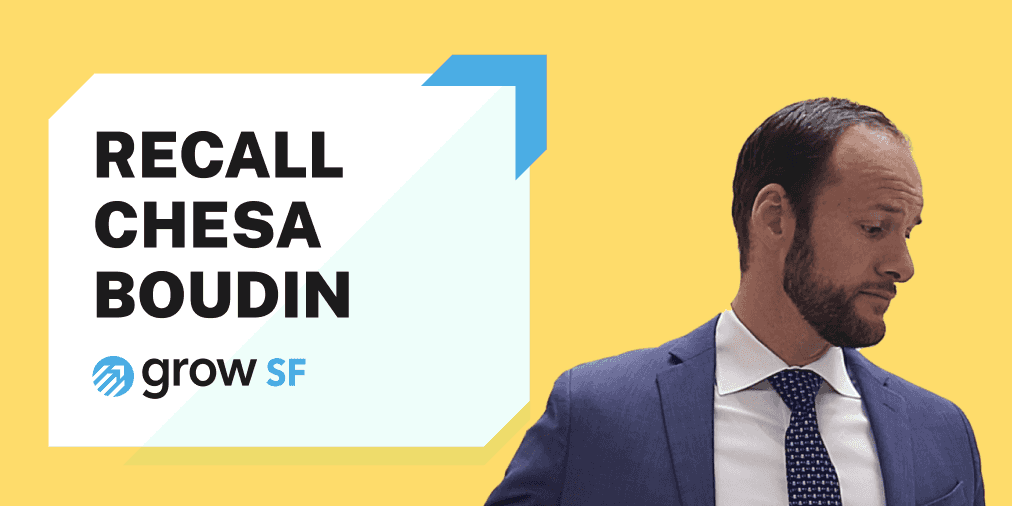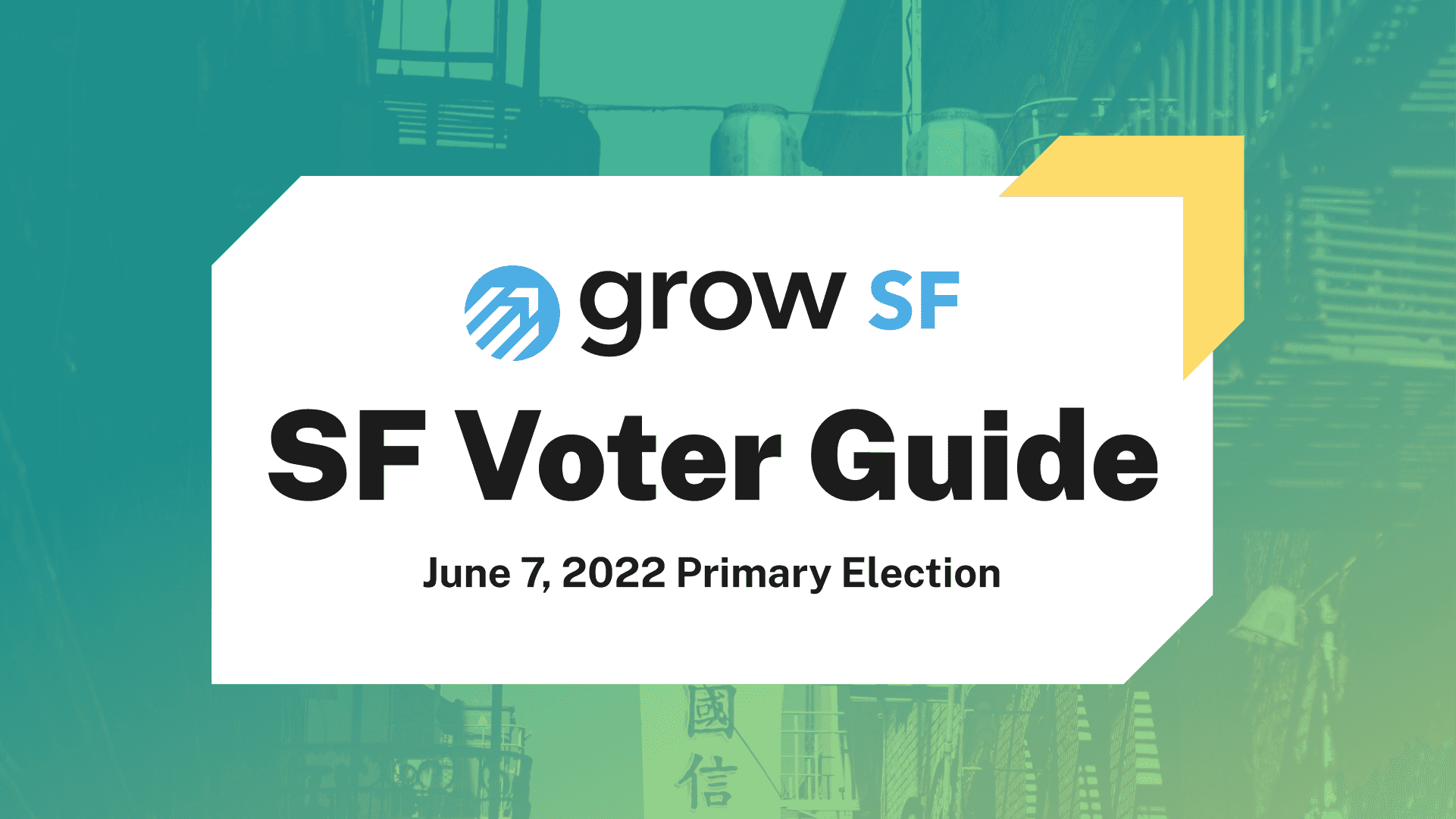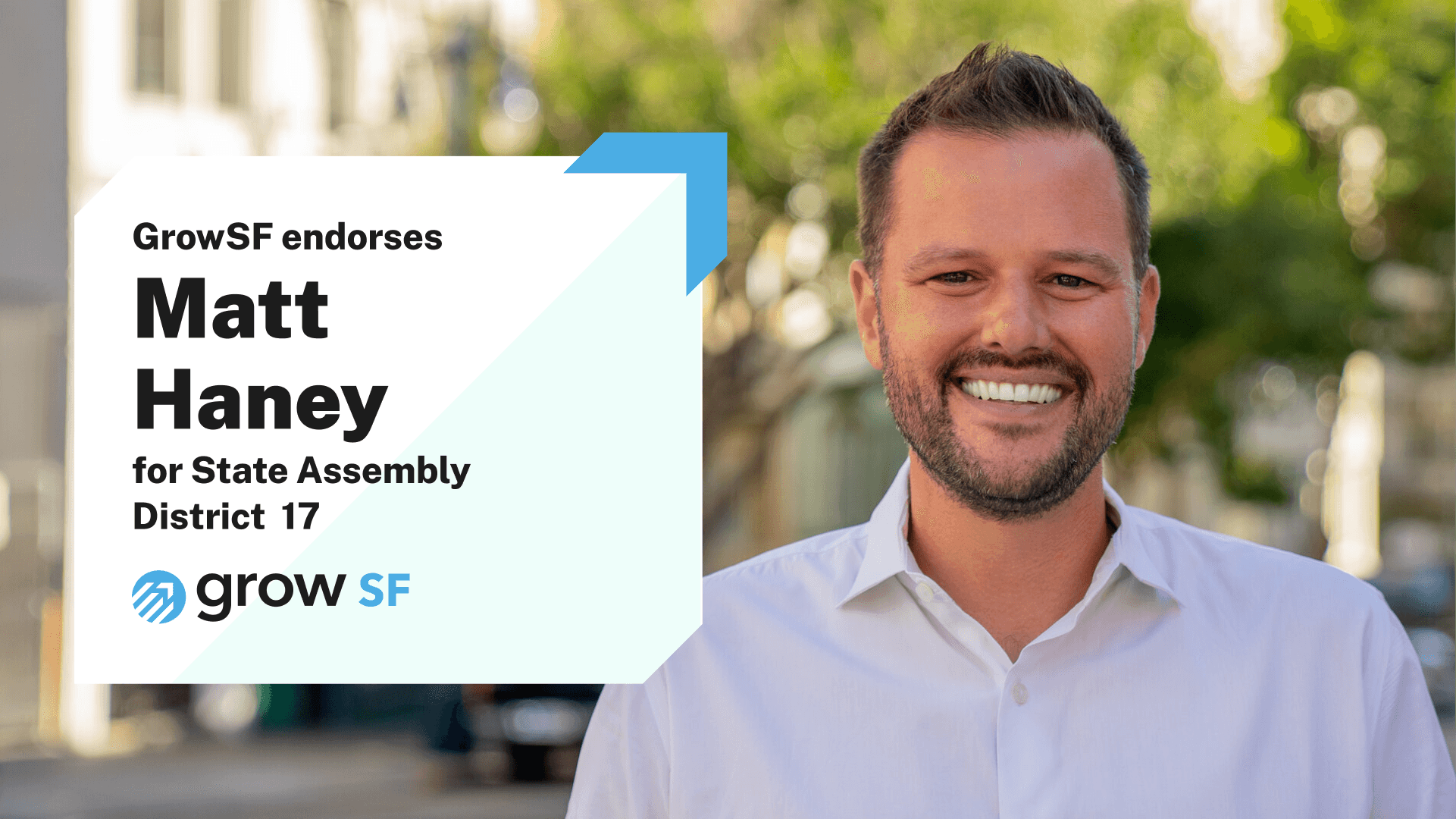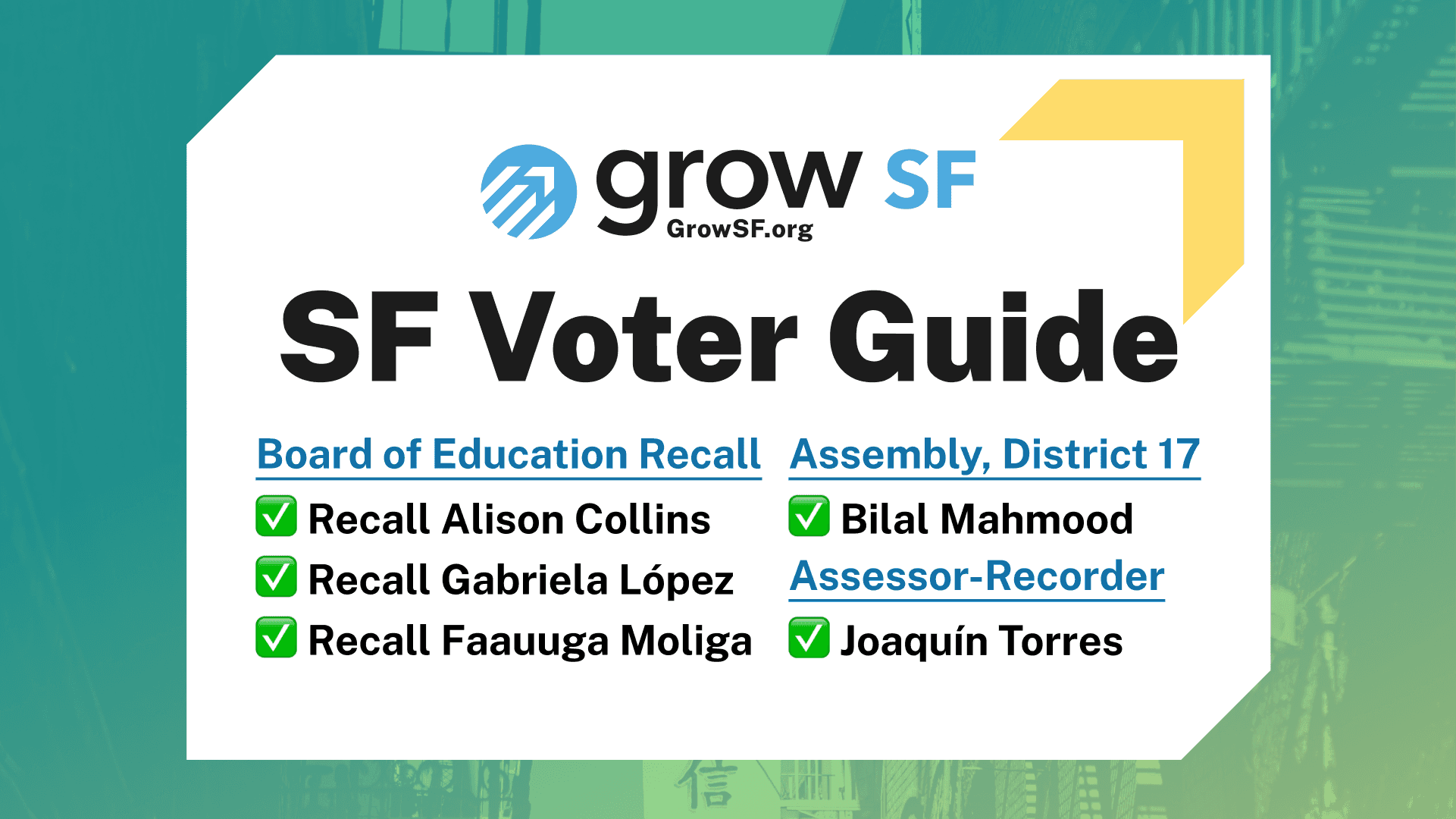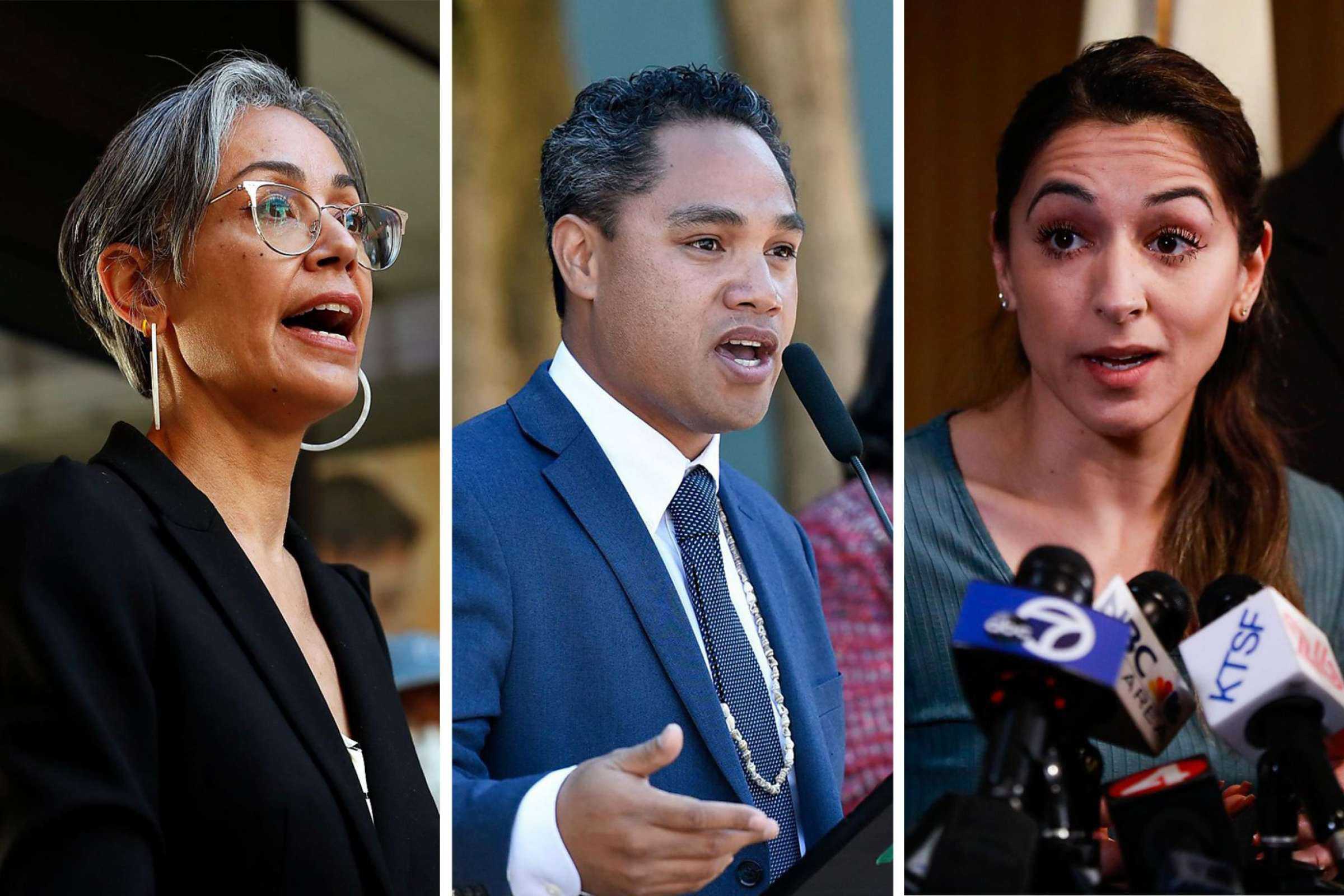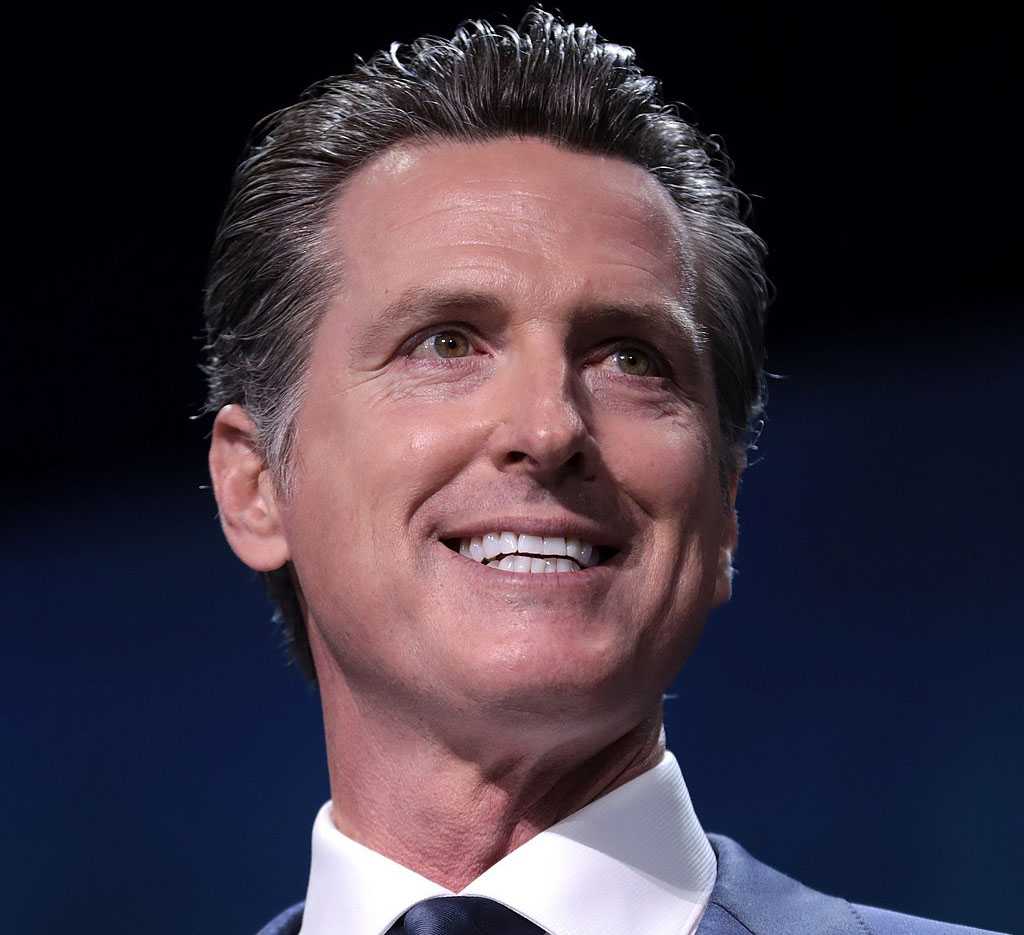GrowSF Voter Guide
Last Updated: October 29, 2025

Our Endorsements
San Francisco
Candidates
The June 2, 2026 Primary Election features important races that will shape San Francisco's future. We're starting with our endorsement for San Francisco Board of Supervisors District 2.
How To Vote
Voting for the June 2, 2026 Primary Election will begin approximately 29 days before Election Day. You should receive your mail-in ballot a couple days before or after voting begins. Once voting begins, you can:
Vote by mail
- Mail your ballot no later than Tuesday, June 2nd, 2026
- If you missed mail pickup, drop off your ballot at your local polling place, or in any city ballot dropbox by 8pm on Election Day
Vote in person
- Vote at City Hall every day through Election Day
- Vote at your local polling place on Election Day, Tuesday June 2, 2026, from 7 am to 8 pm
Explaining Our Endorsements
San Francisco
Supervisor, District 2
TopWe recommend voting for Stephen Sherrill in District 2.
Sherrill brings a lot of professional policy-maker and political experience to the table, along with a laser focus on responsive and effective governance. He served as senior policy advisor in the Bloomberg administration in New York City, led the Mayor’s Office of Innovation here in San Francisco, and as District 2 Supervisor he has cut red tape and focused on helping small businesses, improving public safety, and lowering the cost of living. Through it all, Stephen has shown a consistent commitment to excellence in public service and government accountability.
We feel he’s done a great job as Supervisor and are excited to see him continue to work alongside Mayor Lurie and his fellow Board members to get San Francisco back on track.
Without safe streets, parents won’t let their kids walk to school, businesses can’t keep their doors open, and people lose faith in the city. Rebuilding that trust starts with visible results like cleaner sidewalks, faster responses when people call for help, and better coordination across city departments to address public drug use and improve street conditions.
Supervisor, District 2
Why vote for Stephen Sherrill?
Stephen’s top policy goals are:
1. Public Safety
Sherrill’s top policy priority is public safety, and he's delivered several key victories:
He co-sponsored and passed a resolution to speed up 911 responses to reports of illegal activity near schools, parks, and playgrounds, ensuring that these vital areas don't get neglected.
Sherrill also co-sponsored Mayor Lurie's RV homelessness legislation, ensuring encampments blocking sidewalks, streets, and alleys are regulated with coordinated outreach and clear rules - helping to unblock enforcement of these rules.
Supervisor Sherrill supported more sober housing for people in recovery via the Recovery First ordinance, which supports greater investment in sober living facilities across the city. In his own words, people using drugs in public should “be directed into treatment and services, and moved off the sidewalks so that families and businesses are not forced to live with open air drug use.” And he also supports expanding involuntary holds for people who do not have the mental capacity to care for themselves, either due to mental illness or substance abuse. He notes these holds must include clear medical standards for intervention, judicial oversight, transparency and accountability to prevent abuse or neglect.
Finally, to prevent tragedies, he led the city’s new free firearm storage program, partnering with SFPD to allow residents to store firearms securely and at no cost at police stations.
2. Small Business
In Supervisor Sherrill's district, several commercial corridors have extremely high vacancy rates, leaving them blighted and hurting the businesses that have managed to hold on, like Van Ness from City Hall north to Broadway — a stretch with 53% ground-floor vacancy. To help, he introduced a plan to make it easier for chain stores to fill these longtime vacant spaces which local businesses don't want. The ordinance passed unanimously, opening the doors to new stores.
To support local businesses and people who want to start a business, he helped extend the “First Year Free” program which waives costly city fees for new businesses. To date it's helped over 11,000 local businesses.
3. Good Governance
Sherrill has long been an advocate for government accountability and effectiveness. He’s criticized city hall for letting delays and opaque processes drag on for years, and has called for performance dashboards, departmental scorecards, and real consequences for missed goals.
He brought that ethos to bear during his time leading the Mayor’s Office of Innovation. He broke through departmental barriers to build the All Street Integrated Database (ASTRID), which integrates data from nine street teams across four city departments. ASTRID provided, for the first time, homeless outreach workers with comprehensive, up-to-date information on the people they encounter and their history across teams and departments. People got better care, the city worked faster, and taxpayers saved money. A win-win-win.
Sherrill runs his own office with a focus on data - he measures his success by constituent satisfaction, with a focus on accessibility, accountability, and follow through.
On other issues
Affordability & Families: Stephen highlights the four-pronged issues of affordability - housing affordability, quality public education, great public transportation (safe, clean, and reliable), and affordable childcare. He has been vocal about making this city affordable for families by expanding the childcare subsidy to middle class households and by fixing zoning rules that ban daycares in many parts of the city. Additionally, to bring workers back downtown, he's exploring creating a new childcare subsidy for all downtown workers - regardless of residency.
Housing: Stephen supports streamlining building approvals, reducing CEQA friction for moderate-density developments, and capping discretionary appeals. He argues one of the biggest barriers is “the little hindrances” around permitting rather than outright opposition to construction. He also supported office-to-residential conversion incentives, legislation passed unanimously in 2025, which unlocks funding and tools to transform vacant downtown office space into housing.
Transportation & Safe Streets: He supports reintroducing Vision Zero–style safe design measures and voted to adopt the new Street Safety plan. During Board deliberations, he noted that 12% of city streets are responsible for 68% of severe crashes, and pushed for hardened daylighting, curb extensions, and speed hump installation. He voted in support of adopting the new Street Safety plan, and at the Board hearing pointed to data showing how a small share of streets cause the most severe crashes — pushing agencies to prioritize interventions like daylighting, curb extensions, and speed humps.
Fiscal Discipline: Stephen believes the city has overpromised and underdelivered; his approach emphasizes small, evidence-backed pilots and scaling only once metrics prove success.
Who's running?
Supervisor, District 4
TopWe recommend voting for Alan Wong for the Board of Supervisors, District 4.
Alan Wong was appointed to District 4 Supervisors by Mayor Daniel Lurie in September, 2025. Lurie ran an open process to find a new Supervisor, and Alan was selected from a set of five finalists for the position. We think that the number one priority for the District 4 Supervisors is to make D4 voters feel heard again—and Alan has been doing just that.
To demonstrate this, Supervisor Wong's first act was to submit a ballot measure to re-open the Great Highway. This reflects the majority opinion in the district and sends a clear signal that he isn't bringing his own agenda to the Board, but is there to enact their will. Only two other Supervisors signed on to the measure, so it did not meet the threshold to qualify for the ballot.
Alan grew up in the Sunset, attended Lincoln High, and has an extensive track record of public service. He’s been a labor organizer, a Legislative Aide to former District 4 Supervisor Gordon Mar, led Public Policy and Comms for the Children’s Council of San Francisco, and, most recently, was a Trustee on the Community College Board. He is also a First Lieutenant with the Army National Guard. Alan brings experience working across different political and interest groups to do what’s in the best interest for the communities he represents.
We believe Alan has the level-headed temperament, experience in public service, and dedication to the district to bring stability back to City Hall. And we think the district deserves some continuity of leadership after the past couple tumultuous years.
Why vote for Alan Wong?
Alan’s top policy goals are:
Public Safety. Alan believes public safety and a fully staffed police force should continue to be the city’s top priority. He says “Public safety investments are critical for residents to feel safe, for small businesses to flourish, and for commerce and activity to return to our neighborhoods.”
To help solve the 500-officer shortage, he supports strengthening recruitment for bilingual officers who speak Cantonese, Mandarin, Spanish, and other languages and civilianizing certain desk roles so more sworn officers can return to patrol.
Making Government Work for D4 Residents. District 4 residents consistently ask for responsiveness from City Hall. Alan says he will dedicate half of his staff time to constituent services -that's things like filling potholes, installing stop signs, and working to improve traffic. He has committed to reply within 24 hours to any constituent concern and to follow through across city agencies to make sure issues are resolved. He wants every Sunset resident to have a voice at City Hall, “especially seniors, working families, small business owners, and longtime residents who don’t always have time to organize but whose lives are deeply affected by city decisions.”
Supporting Small Business. Alan says “opening a business in San Francisco is a painful, grueling process that can shut doors before they have a chance to open.” He supports Mayor Lurie's efforts to make it easier for businesses to open and run in the city., In our questionnaire, he said he would launch a program to collect feedback and identify laws for repeal, to reduce or eliminate high fees, and give small businesses a “straightforward checklist of items to complete rather than a byzantine maze of never-ending bureaucracy.” He’d also like to provide hands-on support to fix problems. We think this is a great way to identify and prioritize the highest priority issues for D4 business owners but also the city at large.
Families & Education. The Sunset has long been a home for families just starting out, which means Sunset residents need great schools and daycares for their little ones. Alan wants to ensure families can thrive in the Sunset by supporting early childcare and school choice. We suggest that he should make it easier to open childcare facilities, improve safety and transportation around schools, and push the school district to provide parents with clearer, more transparent enrollment and school-quality information.
On other issues
- Affordability. Alan understands that families are hurting with the rising cost of living. That's why his first vote on the Board of Supervisors was in favor of Mayor Lurie's Family Zoning plan. It will create new starter homes for new families in the neighborhood, make it easier to add rooms to existing homes, and stabilize rents.
- Transit & Parking. As a life-long Sunset resident, Alan knows how important parking is. But he knows that not everyone can drive, so a fast, safe, and affordable bus network is just as important. He will find ways to preserve parking without slowing down the bus, and make it easier to access small businesses.
- Fiscal Discipline. Alan plans to take a pragmatic and holistic approach to the budget role that he will play on the Board of Supervisors; he wants to prioritize core services, scrutinize spending, and consider a mix of savings and revenue options.
- Great Highway. Alan attempted to get a repeal of the Great Highway closure onto the ballot to give voters a final say on the issue, but only Supervisors Chan and Chen signed on to support it, so it did not succeed.
District 4 needs a serious, values-driven public servant, and we believe Alan is still the best candidate — and that he will do the outreach, build the coalition, and ultimately drive this issue to a good outcome.
Who's running?
Board of Education
TopWe recommend voting for Phil Kim for the Board of Education.
Phil has both the experience and the track record that SFUSD needs. Phil is a former public school student and teacher, and a lifelong educator. He led STEM education and policy at K-12 public schools across 20+ states and 300+ schools. He has a Masters in Education, and is currently pursuing his doctorate in Education. Since he joined the Board in 2024, Phil has used his deep understanding of how other school systems have improved student outcomes to begin the process of improving SFUSD’s. He was unanimously elected President by his fellow commissioners in January of this year.
We think Phil has done a great job working with the Board and our Superintendent over the last year and a half to get SFUSD back on track, and would like to see him continue his work.
“We are seeing literacy and math outcomes improving for the first time in years, even as we underwent significant budget reductions last year. As a Board, we must stay focused on effective progress monitoring of our student outcome goals, and holding the superintendent accountable to our guardrails.”
Why vote for Phil Kim?
Phil’s top policy goals are:
1. Student Outcomes
Phil believes school systems exist to improve student outcomes, and has shown relentless focus on bringing 3rd grade reading, 8th grade math, and college and career readiness markers to a competitive level. For the first time in years, we’re seeing improvements. There’s a lot of work to be done to get SFUSD where we all want it to be, but we think Phil is uniquely positioned, and experienced, in driving all parts of the school system towards the right outcomes.
2. Safety & Stability
Phil believes that a safe school is one that is properly resourced with highly competent and trained educators and school operators. He worked with the Board and Superintendent to prioritize and protect teachers' jobs during budget cuts. Phil states that steadiness in personnel is also important towards students feeling safe, and that training, coaching and development are needed to ensure great teachers stay. He is also committed to partnering with the Board and Superintendent to ensure school security staff are better trained and coordinated to prevent and respond to incidents.
3. Access
San Francisco has one of the largest percentages of students enrolled in private schools. Phil believes we must offer language immersion and other sought-after programs in San Francisco to attract more families to SFUSD, and drive enrollments up.
On other issues
1. Data Transparency
Phil is committed to making data publicly accessible. While SFUSD does report its data biannually, it’s hard to find, and harder to understand. This is unacceptable. Phil Kim aims to fix that by aligning the Board and Superintendent on goals, the strategies to achieve them, and the data to measure progress. We look forward to seeing clearer, more digestible, public facing dashboards in the future.
2. Fiscal sustainability
One of Phil’s first actions as President of the Board of Education was to ensure our Superintendent was evaluated on metrics that would align SFUSD with fiscal sustainability. As a result, the district has gone from “negative” fiscal certification to “qualified” and is aiming for the highest, “positive” certification by July of next year, completing the rapid transition out of state oversight.
Who's running?
November 2024 Voter Guide
The following section contains our endorsements for San Francisco local races and measures from the November 5, 2024 General Election. We're keeping this content available as we transition to the June 2026 Primary Election guide.
For California state races and ballot measures from November 2024, see our archived California voter guide.
San Francisco
Candidates
Ballot Measures
Explaining Our November 2024 Endorsements
San Francisco
Mayor
TopSan Franciscans have three qualified candidates running for Mayor. You should vote for all three of the following candidates, in whatever order you prefer:
- Daniel Lurie
- London Breed
- Mark Farrell
We believe all will do a good job with a newly elected Board of Supervisors. All three of these candidates put forward platforms that focus on building more homes, revitalizing downtown, and improving public safety. They all have relevant experience in government or the private sector, and they share a philosophy on government: that City Hall should be efficient, effective, and accountable.
The differences between them are relatively small, which means that a one-size-fits-all recommendation is more difficult to do than normal. It's absolutely critical that you rank all three of them in some order, but within that, you should make a ranking based on the issues that matter most to you. If you're in a hurry, here's a quick summary:
If your top issue is homelessness, vote: Daniel Lurie as your first choice.
If your top issue is public safety, vote: Mark Farrell as your first choice.
If your top issue is housing, vote: London Breed as your first choice.
Read more about these issues below:
- Building More Homes
- Public Safety
- Addiction & Fentanyl Dealing
- Homelessness
- Public Transit & Bikes
- Small Business
No candidate will win on first-choice votes alone, so the winner will be determined by the second and third choice votes. If voters don’t rank all three of these candidates, we might split the common-sense vote and allow a really bad candidate to win. The other candidates in the race have radically different views on what makes a good city: some want to stop construction of new homes in San Francisco, pick and choose which businesses succeed, or even fight against hiring more police officers. One even sabotaged the power of Mayor's office — the very office they're running for! San Francisco deserves better than this.
San Franciscans are more similar than they are different. We all want a city that's safe, clean, and affordable. We all want a city that's welcoming to everyone, no matter their background. And we all want a city that's a great place to live, work, and raise a family. These three candidates will help us get there, and their opponents won't.
How Ranked Choice Voting works
13 people are running for Mayor. Only one can win. With ranked choice voting, you can vote for several people that you would find acceptable.
Your second, third, and later choices do not hurt your first choice. Your vote will always count for your first-choice vote until (and if) that candidate is in last place in a round of counting. Your vote will only move to your second choice if your first choice is eliminated.
Simply put, you should vote for everyone you can tolerate (even if you don't love them).
We recommend voting for Daniel Lurie, London Breed, and Mark Farrell in any order you prefer. If voters rank these three candidates, we are certain to get one of the three. If voters only rank one candidate, there is a chance that someone who doesn’t represent the majority of San Franciscans wins.
Mayoral polling
Curious how the race is shaping up? Our polls show that it's a statistical tie between London Breed, Mark Farrell, and Daniel Lurie. Check out the latest polling data here.
On the issues
Here's where the top candidates stand on the issues that matter most to San Franciscans:
| Issue | London Breed | Mark Farrell | Daniel Lurie | Aaron Peskin | Ahsha Safai |
|---|---|---|---|---|---|
| Building more homes | Build more everywhere | Mostly downtown | Near transit & major streets | Only taxpayer subsidized | No position |
| Fully staff police | Yes | Yes | Yes | No position | Yes |
| Mandated treatment for fentanyl addicts | Yes | Yes | Yes | No position | No |
| Arrest opioid dealers | Yes | Yes | Yes | No position | No |
| Build citywide bike network | Yes | Yes | Yes | No position | No position |
| Build more homeless shelters | Yes | Yes | Yes (2,500) | Yes (2,000) | Yes (2,600) |
| Enforce anti-tent laws | Yes | Yes | Yes | No position | Yes |
| City Hall experience | 11 years | 7 years | None | 17 years | 7 years |
Keep reading for a detailed explanation on each issue:
Independence
Daniel Lurie is the only candidate for Mayor who is not beholden to any entrenched political interests. Since he has not had to make deals with politicians and interest groups for decades, like the other candidates have, he doesn't owe anyone any favors and will bring an independent team into City Hall. Some may see this as a lack of experience, but we don't think someone needs to be part of the problem before they can fix it.
While he hasn't served in City Hall, Daniel Lurie does bring a ton of experience managing organizations and ensuring subordinates and contracted organizations deliver results. As founder and CEO of Tipping Point Community, which funds a diverse set of organizations who deliver things like pre-natal care to homeless women, help youths escape street homelessness, and help adults find housing, he did what City Hall has failed to do for several decades: he actually measured the performance of these organizations and stopped funding the ineffective ones.
So if you're unhappy with stagnant politics and a calcified City Hall, and willing to bet on an outsider, you might want to rank Lurie first.
Building More Homes
London Breed stands out as the best candidate on this issue. Mayor Breed has been a strong supporter of building more homes for the past several years, but the City has failed to make progress because the oppositional Board of Supervisors actually controls where and how many homes can be built. Breed has supported state-level workarounds for San Francisco's dysfunctional homebuilding approval process, publicly called for upzoning the city to allow many more homes to be built, and has helped root out corruption in the Department of Building Inspection.
It's a close call between Lurie and Farrell for second place, and to be totally honest you could decide the order on your ballot with a coin flip.
They both support necessary reforms to the planning process, like streamlining permitting and reforming Discretionary Review (DR) and Conditional Use (CU). They both support building more homes and more homeless shelters. And they both support upzoning to allow more homes to be built in San Francisco.
The only places they differ are: Lurie actually helped build subsidized low-income housing at 833 Bryant via his Tipping Point philanthropic organization, so he knows what it's like for homebuilders to navigate the SF Planning maze. And Farrell would focus new homebuilding in neighborhoods that are already high density like SoMa, the FiDi, and Mission Bay, while Lurie would spread out new homes across the city.
But the good news is that there's no bad choice. All three candidates will be strong on this issue.
Public Safety
Mark Farrell really stands out on public safety.
During Farrell's time as Supervisor and during his short stint as Mayor, he worked effectively and collaboratively with police. He has a strong track record of supporting the police department and has been a vocal advocate for increasing police staffing to recommended levels. Here's what Farrell said in his questionnaire:
As Mayor, I will aggressively tackle the City’s police staffing crisis through a series of policies that will rapidly get the SFPD up to full operational capacity. I will restore the Deferred Retirement Option Program, which will allow hundreds of experienced officers to return to our neighborhoods on patrol and to train new recruits without affecting their pensions. I will ensure a wave of new recruits by fully funding five police academies a year (the maximum per year and more than Breed’s budget proposal), growing the size of our force back to where it needs to be. I will also immediately outsource the background check process for new recruits to trusted third parties, making the process faster, more efficient, and less opaque. I will increase funding for lateral recruitment from other municipalities, and reallocate any unspent funds for vacant positions for recruitment. More fundamentally, I will make it easier for young people from our diverse communities to envision themselves as San Francisco police officers, including by investing in recruitment drives and mentorship opportunities at San Francisco schools and community events. And I will never support cutting SFPD’s budget or appointing Police Commission members who want our officers to do their jobs with outdated tools, strategies, or technologies.
Small Business Owner; former Mayor of San Francisco
Lurie has a similar platform to Farrell on public safety. He also supports increasing police staffing to recommended levels, enhancing police presence in neighborhoods, and leveraging modern technologies to improve law enforcement effectiveness. Farrell has longer experience working this issue, though.
Mayor Breed faced a tumultuous time for the city during Covid, and there were many factors out of her control. The Mayor has less authority over the police than they should: the Mayor lacks the ability to hire a replacement police chief or directly set police policies. Instead, that is reserved for the Police Commission, whose members are handpicked by the Board of Supervisors. But the Mayor can issue directives to the police to prioritize or deprioritize some issues, and the Mayor can use the bully pulpit to advocate for changes to the police department and help recruit new officers. While there's positive change happening over the last few months, it took too long to deploy appropriate resources against the drug markets in the city center and we continue to be disappointed by SFPD's total non-enforcement of traffic laws.
Addiction & Fentanyl Dealing
Mark Farrell has the strongest plan to address the fentanyl overdose and dealing crisis.
There isn't a single right answer to the overdose crisis. Research has shown success in both enforcement-based and harm-reduction-based interventions, so the question voters need to consider is: what have we been doing that isn't working, and what haven't we been doing that we ought to? San Francisco focuses strongly on harm reduction today - with a myriad of nonprofits that focus on giving drug addicts clean paraphernalia (needles, tin foil, pipes) and purity testing kits to help them avoid disease and overdose. We think that this strategy isn't showing the results it needs to for such an important issue.
Farrell is the candidate with the strongest focus on criminal penalties for fentanyl dealers and mandatory treatment for addicts unable to care for themselves. Lurie is a decent choice, but his answers on our questionnaire lack the detail needed to give him the top spot. Mayor Breed has recently upped her efforts to deal with the crisis, including supporting Proposition F in March 2024, which mandated substance abuse treatment for residents seeking certain city services, but it took longer than we would have liked.
Homelessness
Daniel Lurie really shines on addressing homelessness. Lurie is the only candidate in the race who has actual first-hand experience assisting the homeless (via his Tipping Point foundation) as well as building over 140 subsidized low income homes. This real world experience outside of City Hall gives Lurie the perspective and experience to actually understand what's wrong with our homelessness system. Farrell is a solid choice because his plans focus on immediately building more shelters and moving people off the streets and into shelter. However, we're a little concerned that both Farrell and Lurie have a strong affinity for neighborhood engagement rather than just enabling the Department of Homelessness to open shelters wherever they're needed. Under Mayor Breed's tenure, the number of homeless has been too high, although the number of tents is coming down and her emphasis on building more homes will help alleviate homelessness over the next ten years.
Public Transit & Bikes
London Breed takes top marks for public transit and bikes; she really stands out here. Under her administration, the City has expanded its bike lane network by over 300%, created the City's first Slow Streets and car-free streets, helped make JFK Drive in Golden Gate Park into a stellar public space, and ensured MTA survived the pandemic. All that success isn't without some criticism, though: we are disappointed with the state of Market Street and wish the original "Better Market Street" plan had been implemented. And we certainly can't ignore that enforcement of traffic laws fell to nearly zero under her leadership.
Lurie is a solid choice because he supports a protected bike lane network and more red light and speed cameras. Farrell is the weakest, though, as he's a bit wishy-washy on dedicated bus lanes and wants to reopen Market Street to vehicles. We definitely acknowledge that Market Street needs work, but we think that the original "Better Market Street" plan was the right one, so let's just implement that!
Small Business
Mark Farrell is the only candidate in the race with private sector experience and a long track record of supporting small businesses in San Francisco. When he was a Supervisor representing District 2, he passed a small business tax credit plan to help them create more local jobs and helped liberalize zoning restrictions along Union Street which allowed more businesses to get started. Beyond his track record, he also understands the challenges small businesses face in San Francisco today: rampant shoplifting, declining foot traffic, and a lack of support from City Hall. The public safety crisis has hit small businesses particularly hard, and Farrell understands that getting more police officers walking the streets, talking to shopkeepers, and holding criminals accountable is the first step to helping small businesses recover.
Mayor Breed has accomplished a lot in her time in office to help small businesses, but the shoplifting and public safety crises pushed her down from the top spot. In particular, Breed authored Prop H and other small business reforms which have dramatically streamlined the business permitting process. Mayor Breed has had to work with an extremely antagonistic and oppositional Board of Supervisors, and we think that with a better Board, she will be able to deliver even stronger reforms. While Lurie has many good ideas like setting time limits on approvals, we think his biggest ones are too ambitious and disruptive to get done (for example, merging the Department of Building Inspection with other permitting agencies).
Who's running?
Board of Education
TopThe stakes of this election are high: either we elect fiscally responsible candidates who will fix San Francisco Unified School District's (SFUSD's) budget crisis, or the state will take over the district and make across-the-board cuts to close schools and fire teachers without regard to any local voices.
The structural budget deficit which developed over the past decade has put the school district on the path to insolvency. The crisis is so severe that the state has installed a fiscal monitor to oversee the district with the authority to veto any actions taken by the Board of Education.
We have endorsed Parag Gupta, Jaime Huling, John Jersin, and Supryia Ray for Board of Education (also known as the School Board) because they demonstrate a deep understanding of SFUSD's problems and have the experience and knowledge to fix them. They will all prioritize fiscal responsibility, accountability, and transparency to keep our schools from being taken over by the state.
This is no time for politics, it's time for sober leadership that will make the tough decisions needed to save our schools.
Parag Gupta
Parag Gupta shows a solid understanding of the issues facing the school district, and comes with some incredible work experience to ensure the district can get back on track. He has a strong commitment to fiscal responsibility and accountability, and we believe he will be a strong voice for the public on the School Board.
Parag is an executive at Mercy Housing, the nation's largest nonprofit affordable housing organization. At Mercy Housing, he has built and managed teams against high performance standards, a strong need for our school district. At the Stupski Foundation, Parag oversaw a nine-figure philanthropic budget and strategy that helped over 10,000 young people from low-resource households gain access to post-high school educational opportunities, including coordinating with SFUSD to fund mentoring efforts for Sunnydale youth.
Upon election to the School Board, Parag pledges to start a 100-day "war room" to fully understand the district's fiscal picture (there are questions from the state about the district's finances that it hasn't been able to answer) and ensure an independent auditor can confirm the district's position.
Beyond his deep managerial and fiscal experience, Parag is also the dad of a public school student. He says that his daughter refuses to drink the water at school so she doesn't have to use its filthy and broken bathrooms. And her school is considered "good condition" — others have insect infestations, broken windows, and more. His daughter's class even went weeks without a teacher when the district couldn't find a substitute, instead relying on him and other parents to volunteer their time to watch the kids.
I am motivated to run because the next four years will be critical for SFUSD with a potential $421 million deficit, school closures, and failing standards in K-8 math and literacy to name a few. How we address these challenges will determine the viability of SFUSD and our city's ability to attract and retain families for years, if not decades to come. We must elect four school board candidates who will bring excellence and the ability to make difficult decisions. I have the ability and a proven track record to make difficult decisions that SFUSD needs. I will be a board member who will support SFUSD staff and teachers and set students up for success.
Nonprofit Housing Executive; Candidate for School Board
Jaime Huling
Jaime Huling brings unique experience to the School Board, having negotiated high-stakes outcomes in multi-million dollar lawsuits and union negotiations—experience which will be critical when negotiating with the Teachers' Union. As a former SF Deputy City Attorney, she advised top city officials and managed large legal cases on behalf of the city. Currently, she supervises three units of attorneys in Oakland's Affirmative Litigation Division. She makes key hiring decisions, evaluates contractors, and drafts contracts. Jaime serves on the Board of Directors of ScholarMatch, where she reviews the organization's budgets and financial reports, and has led significant organizational changes.
Jaime's top priority is to "stabilize the budget and prevent state takeover of SFUSD." As part of that, she is committed to implementing a new zone assignment system to streamline school assignments and boost enrollment through popular programs like language immersion and Montessori, which may help stave off some school closures or at least make merging some schools easier.
She is committed to addressing the district's financial issues, advocating for streamlining the central office, closing and merging schools, and efficiently using bond money for facility upgrades. Jaime's background in high-stakes negotiations, such as her role in San Francisco's $350 million victory against opioid makers, demonstrates her ability to tackle the district's fiscal challenges and negotiate effectively with strong, entrenched organizations. As an SFUSD parent, she has firsthand experience with the district's challenges, driving her commitment to improving the educational environment for all students.
As a Deputy City Attorney, I advised elected and appointed officers, department heads, and managers.[...] In San Francisco, I led and argued some of the biggest and most complicated cases in the City, making key strategic decisions on litigations worth up to $1.2 billion.[...] As a member of the Board of Directors of ScholarMatch, Inc., I reviewed and approved our budgets, financial reports, and audits.
[...]
At present, the district is drawing down its reserves and relying on one-time funds to balance its budget for the upcoming fiscal year. However, the state budget watchdog has determined that SFUSD has a high likelihood of becoming insolvent in the 2025-2026 fiscal year.
The state has already exerted authority to stop or reverse any budget decisions the board makes that it disagrees with. With its reserves depleted, the district must make significant structural changes to its budget this year in order to maintain its fiscal solvency and avoid the state actively taking authority to make affirmative financial decisions for the district.
The board must realign its resources by streamlining functions of the central office and closing, co-locating, and merging some schools in order to adopt a budget model for 2025-2026 that fits its now smaller student base. If the board fails to do this, the state will take over.
Supervising Deputy City Attorney, Oakland; Candidate for School Board
John Jersin
John brings exceptional experience in running large organizations, managing teams of thousands, improving employee performance, and handling fiscal crises. His primary goals are to fix the district's fiscal issues, address staff shortages, and celebrate students' achievements, encouraging them to reach their full potential.
John has a track record of success, having grown a company to hundreds of millions and led a large division at LinkedIn. His deep understanding of fiscal management is evident and supports the introduction of a Fiscal Advisor to reverse fiscally imprudent decisions.
John acknowledges the need for school closures to address the budget crisis but emphasizes that this alone won't solve the issue. He supports a facilities bond to support the facilities budget, which, in contrast to other areas of the District, has been well-handled recently. To boost enrollment, he proposes fixing the lottery system that limits access to popular schools. His approach to curriculum includes investing in early childhood education, supporting 8th-grade algebra, and expanding AP course offerings. Additionally, John advocates for increasing special education staffing and speeding up the hiring process to resolve staff shortages.
As I see my kids about to spend the next 10+ years in our schools, and I talk regularly with the SFUSD teacher in my family, I see the crises we face - e.g. a fiscal crisis driving school closures and cuts, and a staffing crisis with far too many classrooms without teachers. I also see how the skills and experience I'm lucky to have - e.g. fiscal management, and recruiting leadership, are a direct fit for what SFUSD needs now.
[...]
The fiscal crisis is currently threatening to cause the closure of potentially dozens of schools. Our district is on track to run out of money and cause a state takeover next year, an event that normally takes 10 years to recover from. Kids face a changing school environment, loss of friends, and disruption to their learning. At the same time, our support services for kids are underfunded and often missing. Kids are being hurt by the fiscal crisis already, and it's only getting worse.
That said, it's fixable. As an appointee to the Citizen's Bond Oversight Committee, I found millions of dollars in potential savings for SFUSD after my first meeting. I've found more opportunities since then, and in each case we can both improve services for students and save money at the same time. By bringing badly needed fiscal experience to the board, and by doing the hard necessary work, I will get SFUSD back on track and fully fund our schools.
Supryia Ray
Supryia demonstrates a solid understanding of SFUSD's issues. Her background as a Harvard Law graduate, lawyer, writer, and adult ESL teacher is impressive and will bring valuable experience and perspective to the board. Notably, she is the only candidate who declined to sign the Teachers' Union pledge, emphasizing her independence while highlighting that the pledge asked for commitments she found to be fiscally irresponsible. Her top goals are the financial crisis, reducing absences, providing strong academic support, and ensuring student safety from bullying.
Supryia's experience includes advocacy work during the pandemic to reopen schools and personal struggles with the SFUSD lottery system that repeatedly failed her children. She believes the Board's primary goal should be to hold the Superintendent accountable for their execution. She supports a Fiscal Advisor to help the district navigate the financial crisis and advocates for a more transparent budget process. Supryia also emphasizes the importance of data-driven decision-making, focusing on student outcomes and fiscal responsibility.
Local government decision-making, especially amidst a budget crisis, is all about making difficult decisions. For too long, our School District has failed to make difficult calls and has added or continued programs that may have been popular but did not result in better student outcomes. My general approach in the education arena is to assume good faith among all parties, but I look at the relevant facts, law, circumstances, and data in reaching positions. I state my positions directly but with respect and openness to opposing views.
Who's running?
Community College Board
TopWe need new leaders who understand the crisis and will take the hard votes to fix City College. Heather McCarty, Ruth Ferguson, Aliya Chisti, and Luis Zamora have what it takes.
City College is in crisis. Due to poor oversight from the current and past Boards, City College has misspent tens of millions of dollars, failed to build up its fiscal reserves, and experienced a huge drop in enrollment. Now, state regulators have stepped in and presented City College with 119 concerns they need to fix.
In our questionnaires (see the table below), these candidates show the deepest understanding of the college’s current budget, as well as how the college ended up with such a large deficit. In addition, they all present realistic and varied plans to fix them. From expanding partnerships with SFUSD to boost dual-enrollment (which is way lower than similar community colleges), boosting revenue-generating programs, increasing enrollment, to downsizing staff and reducing or eliminating investments in ineffective programs, there’s many paths to try.
And, importantly, they all take their role as an oversight body seriously. Rather than micromanage City College’s chancellor, they want to set clear guidelines, establish open communication, and have transparent budgets so everyone knows what they’re responsible for and who is falling short.
We must save City College, and we can only do it by electing four candidates that take the problems, and the solutions, seriously.
Who's running?
BART Board, District 7
TopVictor Flores is new to public service, but he balances that with a focus on smart internationally-proven policy to boost BART ridership and revenue growth. He proposes a Hong Kong style program called "Rail plus property" which would allow and incentivize BART to develop land around stations into high-density housing and office towers. That development would help pay for BART's operations while boosting ridership at the same time. This is also implemented to great effect in other cities, like Tokyo.
Dana Lang brings decades of experience in public service, including Small Business Affairs Officer at SF International Airport, Senior Administrative Analyst with the SFMTA, Federal Grants Liaison at the Metropolitan Transportation Commission, and a Grants Unit Manager at SFPD. However, her focus on pursuing grants rather than boosting BART's revenue make us concerned that her stewardship won't properly address the long-term fiscal health of the system.
Both candidates will maintain BART's renewed focus on public safety and work to improve station cleanliness. We're disappointed that neither candidate is interested in automating BART, which would save money and improve performance.
Who's running?
BART Board, District 9
TopJoe Sangirardi brings the best of all worlds to the BART Board: an understanding of the issues, a focus on fiscal health, smart ideas like building revenue-generating housing and offices on and around BART stations, and a commitment to public safety. We're proud to endorse Joe Sangirardi for BART Board.
Who's running?
Supervisor, District 1
TopWe recommend voting for Marjan Philhour as your #1 choice. Marjan has demonstrated a deep commitment to addressing San Francisco's public safety challenges and helping small businesses thrive.
Running for District 1 Supervisor is an opportunity to make a significant impact in the Richmond, a community I have been a part of for decades. Our community faces unique challenges that I am committed to addressing effectively as District Supervisor. My top concern is public safety. Our police department is woefully understaffed, which is making the challenges we face in our neighborhood worse. We must also focus on supporting our local businesses, housing creation, and quality education. Families and working people have been pushed out of the City for years - it’s time for a new direction to ensure everyone can find opportunity in San Francisco.
Candidate for Supervisor; Neighborhood Business Owner
On the issues
Here's where the top candidates stand on the issues that matter most to residents of District 1:
| Issue | Philhour | Connie Chan (Incumbent) | Jen Nossokoff |
|---|---|---|---|
| Mandated treatment for fentanyl addicts | ✅Yes | ❌No position | ❌No |
| Arrest fentanyl dealers | ✅Yes | ❌No position | |
| Enforce anti-tent laws | ✅Yes | ❌No position | ❌No position |
| Fully staff police |
Read our deep-dive on the candidates' fentanyl crisis plans here.
Why vote for Marjan Philhour?
Her top policy goals are:
1. Public Safety
Marjan's top priority is rebuilding and fully resourcing San Francisco's public safety infrastructure to immediately address the safety concerns of residents in the Richmond District. She advocates for increasing police staffing to recommended levels, enhancing police presence in neighborhoods, and using modern technologies to improve law enforcement effectiveness.
2. Small Business
Marjan emphasizes the need to revitalize and protect local small businesses. She proposes initiatives such as providing grants, business development services, and incentives for local hiring. Her approach includes reducing bureaucratic barriers, streamlining the permitting process, and fostering public-private partnerships, which are crucial for economic recovery and growth.
3. Community Engagement
Marjan plans to hold regular office hours in the Richmond and establish resident-led committees to ensure diverse voices are heard and policies are inclusive and effective. This commitment to direct communication and collaboration aligns with GrowSF's mission for vibrant community life.
On other issues: Marjan supports building new housing at all income levels all across the city. She supports reforming the onerous rules and regulations that stop people from building new homes. She supports pro-family policies like the existing Free MUNI program for children and students, which helps them get to school and after-school activities without needing their parents to drive them, and without burdening their families with higher costs. And she believes in fare enforcement for adults to ensure our transit system is well-funded and safe for all riders. She takes a holistic approach to public transit and car traffic, supporting both parking for cars and bike lanes to keep cyclists safe.
Who's running?
Supervisor, District 3
TopWe recommend voting for Danny Sauter for Supervisor in District 3 as your #1 choice. Danny will be a needed advocate for effective measures to deal with crime, fentanyl dealing, homelessness, and housing affordability and pairs it all with a deep connection to the neighborhood.
I’m running because I believe we need leadership who knows these neighborhoods and is from outside the same old City Hall machine in order to actually get things done and move beyond political grandstanding.
How we respond to District 3’s challenges in the next few years will define the next decades of the entire city of San Francisco. From our tourism recovery in Union Square and Fisherman’s Wharf to our drug crisis in Lower Nob Hill and our economic recovery in the Financial District, our District 3 neighborhoods will have an outsized role in the future of our city.
[...]
I will work with anyone on the board in which we can find common ground and bring people together to get results. I’m not an extremist and I’m interested in outcomes and results over everything else.
Candidate for Supervisor; Neighborhood Center Director
On the issues
Here's where the top candidates stand on the issues that matter most to residents of District 3:
| Issue | Sauter | Moe Jamil | Sharon Lai |
|---|---|---|---|
| Mandated treatment for fentanyl addicts | ✅Yes | ❌No position | ❌No position |
| Fully staff police | ✅Yes | ✅Yes | ✅Yes |
| Build homes for all incomes | ✅Yes | ||
| Clean streets via enforcing anti-tent laws | ✅Yes | ✅Yes | |
| Build citywide bike network | ✅Yes | ✅Yes |
Read our deep-dive on the candidates' fentanyl crisis plans here.
Why vote for Danny Sauter?
Danny Sauter's top policy goals are:
1. Public Safety
Danny understands that keeping people safe is one of the city's most important jobs. He wants a police department that's fully staffed, works well, and is held responsible for its actions. He wants to improve city coordination by matching police district boundaries with Supervisor district boundaries, keep district Police Captains in their jobs longer to drive more consistent leadership, and increase bilingual officer bonuses so that SFPD can stay effective with District 3's diverse population.
Additionally, Danny supports arresting and prosecuting drug dealers, with special enhancements for fentanyl dealers. With over 800 people dying every year from fentanyl overdoses, Danny understands that we can't just keep ignoring the crisis — we need to hold dealers accountable.
2. Housing
Danny wants to fix San Francisco's housing shortage. He supports reforming the two policies that create the most delays: Discretionary Review and CEQA. He supports creating a citywide housing plan (the Housing Element) that will both satisfy California state law to build more homes while addressing the needs of current residents. He supports building both market-rate and subsidized affordable housing, and in loosening density limits so we can add more bedrooms to existing buildings we already know and love.
3. Economic Recovery
Danny has a strong track record of supporting small businesses and revitalizing commercial corridors. Danny wants to make it easier, faster, and cheaper for new retail stores to open.
Danny has deep roots in his community and a track record of getting things done. During the Covid-19 pandemic, Danny launched "North Beach Delivers" which helped both local businesses and residents struggling to afford food. Through donations and lots of volunteer effort, he made sure needy families stayed fed and struggling small businesses stayed afloat. He started the North Beach Farmers Market and secured grants for local businesses. He's served on the board of North Beach Neighbors for eight years, is the first-ever Housing Chair of the Sierra Club San Francisco Housing Committee, and serves as the District 3 Director of the Eastern Neighborhoods Democratic Club.
Danny's policies align with the needs and priorities of District 3 residents and San Francisco generally, and we know that he gets things done.
We endorsed Danny when he ran for Supervisor in 2020, but he came in second place against the incumbent Aaron Peskin. We're excited to endorse him again in 2024, and this time we know he can win!
Other candidates
Matthew Susk also has many good ideas and often aligns with GrowSF's policy goals. If you choose to rank him, be sure to rank Danny Sauter as well.
Who's running?
Supervisor, District 5
TopWe recommend voting for Bilal Mahmood for Supervisor in District 5 as your #1 choice. He pairs a strong track record of community service with a deep understanding of the issues facing the district. His priorities are public safety, ending the fentanyl markets plaguing the Tenderloin, streamlining government permitting for small business, and reforming San Francisco's anti-housing laws so the city can build many more homes.
After 4 years of Dean Preston as our Supervisor, the outcomes of our district have gotten significantly worse. A 20% rise in opioid deaths in the Tenderloin. Over 1000 businesses closed in Hayes Valley and the Haight. Housing developments sitting completely empty - on parking lots to car washes - because Dean failed to act.
We need a Supervisor who will get results for District 5, not make excuses for their policy failures. And I have a decade of experience in getting results.
On the issues
Here's where the top candidates stand on the issues that matter most to residents of District 5:
| Issue | Mahmood | Dean Preston (Incumbent) |
|---|---|---|
| Build homes for all incomes | ✅Yes | ❌No |
| Fully staff police | ✅Yes | |
| Arrest fentanyl dealers | ✅Yes | ❌No |
| Plan for meeting state housing goals? | ❌No |
Read our deep-dive on the candidates' fentanyl crisis plans here.
Why vote for Bilal Mahmood?
Bilal's experience in the public sector makes us confident that he will do a great job as Supervisor. He was a policy analyst in the Obama administration at the Office of Innovation and Entrepreneurship, founded and sold a company, and now serves as a member of the San Francisco Democratic County Central Committee, where he has been a strong advocate for affordable housing, public safety, and economic development.
Bilal's top three policy goals are:
1. Housing
Bilal will address the housing shortage by slashing red tape that slows down homebuilding. Unlike his opponents, he wants to speed up all types of housing: homeless shelters, subsidized homes, and the market-rate homes that over 90% of people live in. He wants to make the permitting process clearer and based on clearly defined rules, not arbitrary decisions by political appointees, activists, and bureaucrats. He wants to enable more design and permitting approvals to happen simultaneously instead of one after another, and use technology to make it easier for residents to work with city departments. These changes will help San Francisco build more subsidized low-income, market-rate, and middle-income homes to ensure that regular people can afford to live in the city.
2. Public Safety
Bilal prioritizes addressing the fentanyl crisis and filling emergency first responder vacancies. For addressing the Tenderloin's drug markets, he supports the Drug Market Intervention (DMI) approach, which combines these three approaches:
Law enforcement, community members, and social service providers form a partnership to carry out a DMI on a specific drug market.
Law enforcement arrests violent dealers, and notifies nonviolent dealers to attend a "call-in," a face-to-face meeting with law enforcement officers, social service providers, and community members where they are issued an ultimatum. Either they continue dealing drugs and go to jail, or they stop and are given a second chance.
Social service providers provide help to dealers and users willing to accept it.
Bilal also emphasizes the need for more officers walking in neighborhoods, building relationships and increasing visibility, retaining police captains for longer periods, and reducing red tape that hinders police effectiveness. It's the right balance of compassion and enforcement for District 5.
3. Economic Recovery
To help revitalize downtown, Bilal plans to make it easier, faster, and cheaper to launch a new business. He favors creating incentives for startups and small businesses to set up shop in the many vacant office spaces, which is critical to shoring up our tax base and bringing life back to our downtown core. The increased foot traffic from more businesses will rejuvenate the downtown area, create jobs, and support the city's transit systems through higher ridership.
The other candidates
Other candidates, like Autumn Looijen and Scotty Jacobs also have many good ideas and often align with GrowSF's policy goals. If you choose to rank them, be sure to rank Bilal Mahmood as well.
Who's running?
Supervisor, District 7
TopWe recommend voting for Matt Boschetto for Supervisor in District 7. Matt’s practical approach and commitment to public safety, mental health, addiction recovery, financial accountability, and small business support aligns closely with the priorities of GrowSF and the voters of District 7.
I think my greatest strength as supervisor will be building support across the board, in City Hall and with the different interest groups in the city. I am accessible and collaborative by nature. I can work across the aisle and maintain positive relationships, making compromises where it is essential to move the needle.
On the issues
Here's where the top candidates stand on the issues that matter most to residents of District 7:
| Issue | Boschetto | Myrna Melgar (Incumbent) |
|---|---|---|
| Fully staff police | ✅Yes | ✅Yes |
| Mandated treatment for fentanyl addicts | ✅Yes | ❌No |
| Arrest fentanyl dealers | ✅Yes | ✅Yes |
| Build homes for all incomes | ✅Yes | |
| Discretionary Review reform | ✅Yes | ✅Yes |
| Clean streets via enforcing anti-tent laws | ✅Yes | ❌No position |
Read our deep-dive on the candidates' fentanyl crisis plans here.
A note on Myrna Melgar's answers
Supervisor Melgar submitted an updated candidate questionnaire well after the deadline, and we have updated this page accordingly. But in the spirit of fairness and transparency, we wanted to highlight the answers she changed:
| Question | Myrna Melgar's Original Answers | Myrna Melgar's New Answers |
|---|---|---|
| Do you support policies commonly referred to as “defund the police”? Why or why not?' | Yes, I think our Police force has been responsible for responding to too many societal ills that are not necessarily law enforcement appropriate, such as mental illness or homelessness. I think shifting these activities to other departments will free up police to deal with crime. I also admire the model of the Department of Public Safety in Sunnyvale, which is an integrated Police and Fire Department with trained EMTs | I think our police force is responsible for addressing too many social issues that are not necessarily appropriate for law enforcement, such as responding to crises for those dealing with mental illness or homelessness. Shifting these activities to other departments will allow police to deal with crime. |
| Please explain why you did or did not support the recall of DA Chesa Boudin. If you were ineligible to vote in that election, please explain how you would have voted. | I opposed ALL the recalls. I think that when we have difficult times, recalls can be destabilizing and expensive. | I did not take a position on the recall of the DA. I have concerns about recalls as a tool and wanted to leave it up to the voters to decide. |
| Did you support the recall of Board of Education members Collins, López, and Moliga? Please explain why you did or did not support the recall of each member. | I opposed ALL the recalls. I think that when we have difficult times, recalls can be destabilizing and expensive. The school board members would have served only 6 additional months before their reelection. | I did not take a position on the recall of the School Board members, again due to my concerns over the use of recalls and my desire to allow the voters to express their opinions. |
| Should it be the policy of San Francisco to build a citywide protected bike lane network? Why or why not? | YES!!! | YES!!! We should do everything we can to foster a city that allows for accessible, green transportation alternatives, and a protected bike lane network would do wonders to help foster more residents’ use of emissions-free transit options. |
| What do you dislike the most about San Francisco? | The weird quirk in our culture that even though we see ourselves as so liberal, we are actually quite conservative. | The political infighting and finger pointing that has stalled our ability to make progress on the issues plaguing our community. |
| Link to questionnaire | Original answers | New answers |
Why Vote for Matt Boschetto?
Matt Boschetto offers a balanced approach to the key issues facing District 7, emphasizing public safety, mental healthcare, addiction treatment, and financial transparency. His policies are designed to enhance community safety, support local businesses, and ensure effective city management.
His top policy goals are:
1. Public Safety
Matt's top priority is "making the city safe for all residents." He supports increasing police staffing to recommended levels and ensuring police are actually present in neighborhoods. But his solutions aren't just about staffing levels, he also wants police to use modern technologies to improve their efficiency and effectiveness. Matt supports giving the police what they need to do their job and keep us safe.
2. Mental Health and Addiction
Matt prioritizes effective and practical measures to get people off of the streets and into treatment. He supports solutions like mandatory treatment for drug addiction, temporary hospital holds for those in a mental health crisis, temporary shelters for people to sober up, more medical treatment services, and less reliance on "harm reduction" approaches that enable addicts and lead to overdoses. He emphasizes the need for comprehensive mental health and addiction recovery infrastructures to ensure those in need receive the appropriate care and support.
3. Financial Accountability
Matt aims to bring rigorous financial accountability and transparency to City Hall by conducting comprehensive audits of each city department and recipient of government contracts and grants to ensure they are delivering on their mandates. By reallocating funds from underperforming programs to more effective solutions, he seeks to optimize the use of city resources. He says he would work to create a publicly accessible dashboard for city finances, so residents can see where their money is going.
4. Small Business Support
Matt’s personal experience as an entrepreneur and founder of the small business "Matilda's Bloom Box" informs his strong support for local businesses. He pledges to make it easier and cheaper to launch a new business by reducing the cost and time to obtain permits, streamlining the process to obtain those permits, and to fast-track businesses that don't have negative health & safety impacts.
Who's running?
Supervisor, District 9
TopWe recommend voting for Trevor Chandler as your #1 choice. Trevor is the only candidate in the district who says fentanyl dealers should be arrested and prosecuted, that the homeless should be moved out of tents and into shelters, and that we need to build more housing all over the city to bring down the cost of living.
I am running for D9 Supervisor to ensure District 9 voters have safe and clean streets and a City Hall that works for them, not against them. For decades we have had leaders more focused on sound bites than sound policy, resulting in historically large budgets delivering worse results. It is time for some common sense and it is time to get back to basics so we can have a well run city.
[...]
My career has been one of bridging complex political divides and getting results. Given the overwhelming majority of voters across the city who want this to happen, the main obstacle is getting Supervisors elected who also share this goal.
Candidate for Supervisor; Public School Teacher
On the issues
Here's where the top candidates stand on the issues that matter most to residents of District 9:
| Issue | Chandler | Roberto Hernandez | Jackie Fielder |
|---|---|---|---|
| Mandated treatment for fentanyl addicts | ✅Yes | ❌No | ❌No |
| Build homes for all incomes | ✅Yes | ||
| Arrest fentanyl dealers | ✅Yes | ❌No position | ❌No position |
| Community policing approach | ✅Yes | ✅Yes | |
| Fully staff police | ✅Yes | ❌No position | |
| Clean streets via enforcing anti-tent laws | ✅Yes | ❌No | ❌No |
Read our deep-dive on the candidates' fentanyl crisis plans here.
Why vote for Trevor Chandler?
Trevor's top three policy goals are:
1. Public Safety
Trevor says his #1 priority is "an accountable, responsive, and fully staffed police department."
Our polling shows that 93% of San Franciscans support arresting fentanyl dealers, who have caused over 800 overdose deaths in the last year. And when just looking at Mission, Bernal Heights, and Portola residents, 90% of District 9 residents support arresting and prosecuting dealers.
Trevor clearly states that a well-trained and funded police department is essential to a safe city, while his opponents in the race have called to defund the police.
But Trevor also knows the police must be accountable and responsive to the community, and that non-police options are crucial so everyone in the community feels safe when asking for help. He proposes "a Community Safety Liaison," like District 8 has successfully piloted, who will serve as a non-police interface for community members in order to improve community safety.
Trevor also support the "common sense and accountable" approaches like red light cameras, speed cameras, and automated license plate readers that keep our streets safer while allowing police to focus on dangerous offenders.
2. Recovery and treatment
The status quo isn't working. Ignoring the suffering on our streets won't make it simply go away. We need to help people into treatment, shelter, and medical care, and Trevor is dedicated to ensuring that happens.
Trevor is sober, and knows that recovery is possible with the right support networks and treatment that meets people where they're at. Some need abstinence-based treatment, some need medication-assisted treatment, some will do fine with therapy, and still others need more intensive care. Trevor believes in an "all-of-the-above approach for addressing our addiction crisis," and says treatment centers "should be recovery-focused, not enablement focused."
Open air drug use is unacceptable. I believe in a balanced, treatment first approach for those abusing drugs on City sidewalks that includes confiscation and enforcement as options. A tiered enforcement approach of sobering centers, mandated treatment, and the arrest or conservatorship of repeat offenders is a reasonable approach to ensuring we are keeping our streets safe and clean while also maintaining a recovery-focused strategy.
Candidate for Supervisor; Public School Teacher
3. Building homes for all
Finally, Trevor is the only candidate in this race who says we need to build more homes all over the city to bring down the cost of living. He is the only one who acknowledges reality, saying "San Francisco has consistently underbuilt housing for decades." His plan to fix our shortage of homes includes reforming the permitting process so it doesn't take six years, invest in subsidized homes for low income residents, and ensure every neighborhood plays their part in making room for new neighbors.
And, importantly, Trevor knows that every neighborhood must do their part. He will work hard to ensure equitable, city-wide home building so that every neighborhood has a mix of homes for all income levels.
Trevor has what it takes to accomplish these goals. Trevor now works as a public school teacher in San Francisco, but before moving to San Francisco about 10 years ago, he worked with the Human Rights Campaign on seven different marriage equality campaigns across the United States. Subsequently, he served as Director of Government Affairs and Public Policy at Citizen App. Trevor is a member of the California State Board of Pharmacy, where he has taken votes to empower small pharmacists to initiate addiction treatment, and is an elected member of the San Francisco Democratic Central Committee.
We believe Trevor Chandler is the best choice for District 9 Supervisor. His deep and practical experience combined with his commitment to public safety, homelessness, and housing affordability make him the best candidate to represent the residents of the Mission, Bernal Heights, and the Portola.
Who's running?
Supervisor, District 11
TopWe endorse Michael Lai for Supervisor in District 11. Michael is the only candidate in the race who emphasizes a fully staffed and accountable police department, comprehensive solutions to homelessness, and increasing housing supply to make living in San Francisco affordable.
I'm running for D11 supervisor to fight to keep my family's story alive, and fight for an often forgotten & marginalized district full of working families, prioritizing public safety, quality affordable childcare & schools, building housing (especially workforce & affordable housing), and small business vibrancy.
Candidate for Supervisor; Early Education Director
On the issues
Here's where the top candidates stand on the issues that matter most to residents of District 11:
| Issue | Lai | Chyanne Chen | Ernest Jones | Adlah Chisti |
|---|---|---|---|---|
| Build homes for all incomes | ✅Yes | ✅Yes | ||
| Fully staff police | ✅Yes | ❌No position | ✅Yes | ❌No |
| Arrest fentanyl dealers | ✅Yes | ❌No position | ✅Yes | ❌No position |
Read our deep-dive on the candidates' fentanyl crisis plans here.
Why Vote for Michael Lai?
Michael's top three policy goals are:
1. Safe and Clean Streets
Michael understands the critical need for safe and clean streets. He emphasizes the importance of a clean city through more efficient public works, street cleanups, and enforcement against illegal dumping. He advocates for a "fully staffed, efficient, and accountable" police department, increased traffic enforcement, higher clearance rates in the DA's office, and more mental health beds.
2. Affordable Housing
Michael is committed to making it easier to build all types of housing and increasing funding for subsidized low-income housing. He supports upzoning along commercial and transit corridors, and streamlining the permitting process. These reforms will make it easier, faster, and more affordable to build homes in San Francisco.
3. Economic Recovery for Small Businesses and Downtown
Michael aims to revitalize struggling small business corridors in District 11 and downtown San Francisco. He supports creative initiatives to attract businesses back to downtown, which would also help our struggling transit systems by increasing ridership. His approach includes reducing the number of permits, the time, and cost to start a new business.
Michael's professional experience demonstrates his capability to achieve these goals. He has a strong background in community organizing, serving on the board of Wu Yee, the largest Head Start preschool in SF, and has taken active roles in several civic and professional organizations. He created a network of new types of small child care centers that helped add needed supply into the early childhood care system.
Michael's focus on arresting fentanyl dealers, ensuring a responsive police department, and building more affordable housing aligns with what's needed in District 11. His holistic approach to public safety includes both enforcement and community-based solutions. He supports evidence-based approaches to addressing the city's overdose crisis and expanding mental health services.
We need a fully staffed, efficient, and accountable police department. We need increased traffic enforcement & stop lights and cameras. We need higher clearance rates in our DA's office, and from judges around repeat offenders. We need more mental health beds, a reformed code around conservatorship, crackdown on fentanyl dealing, and expanded treatment & services, so people can get off the streets and into the care they need.
Candidate for Supervisor; Early Education Director
Finally, Michael is one of the only candidates in District 11 who acknowledges the critical need for more homes in San Francisco. He is committed to making the permitting process more efficient and ensuring that every neighborhood plays a part in solving the housing crisis.
We believe Michael Lai is the best choice for District 11 Supervisor. His practical experience, commitment to public safety, focus on lowering the cost of living, and support for small businesses make him the ideal candidate to represent the residents of Excelsior, Oceanview, and Ingleside.
Who's running?
District Attorney
TopSince taking office in 2022, Brooke Jenkins has restored the public's trust in the District Attorney's office and prioritized pursuing fentanyl dealing, shoplifting, and anti-Asian hate crimes. She has worked to ensure that the office is transparent, accountable, and efficient. Under her leadership, conviction rates are up, crime rates are dropping, and repeat shoplifters are being held accountable.
Tackling the Drug Crisis
Jenkins has made it her top priority to combat the open-air drug markets that have plagued San Francisco. Under her leadership, the District Attorney’s Office established a new Narcotics Prosecution Team to aggressively target and disrupt drug dealing operations, particularly those involving extremely deadly substances like fentanyl. In just two years, felony narcotics convictions have more than doubled compared to previous years, a testament to her commitment to holding drug dealers accountable and making our streets safer. Jenkins' all-hands-on-deck approach, in collaboration with local, state, and federal law enforcement agencies, has been crucial in this effort.
My top priority is reigning in the open- air drug markets and holding drug dealers accountable. It is unacceptable to me that for far too long fentanyl dealers could act with impunity as they peddled death on our streets, resulting in 2-3 drug-related deaths a day. Fentanyl dealers experienced free reign in the city during my predecessor's time in office, creating an environment where open-air drug markets have been able to seep into every part of our city with minimal accountability.
Shortly after taking office, I revoked over 30 lenient plea offers made by the previous administration that had not been accepted, and quickly got to work setting new policies and direction for how narcotics prosecutions would be handled by my administration.
District Attorney
Supporting Victims and Vulnerable Communities
Jenkins defends the rights of victims and vulnerable communities, in part by creating the new "Vulnerable Victims" unit to prosecute hate crimes and violence against elders. She stands up for workers and created a new Workers' Rights Unit to prosecute employers who take advantage of their employees. And she has embedded victim advocates in high-need areas like the Tenderloin and Bayview districts. Her dedication to ensuring victims are seen, heard, and supported has been a key part of her administration’s efforts to restore trust and safety in the city.
Physical violence against our elders has become an all-too-common occurrence, which is absolutely unacceptable. To address this issue, I have developed a Vulnerable Victims Unit which will handle violence against elder cases and hate crime cases. This unit is staffed by senior level attorneys who will be more prepared to assist in investigating these cases and conducting the jury trials as well.
District Attorney
Combating Shoplifting
Rampant shoplifting is a serious issue in San Francisco, in part due to state law, but Jenkins has taken decisive action. Her office secured a $17 million state grant to combat organized retail theft, and designated a dedicated team to work closely with law enforcement and local businesses. By treating these crimes with the seriousness they deserve, several theft rings have been busted, over 300 arrests have been made, and the DA has obtained convictions for repeat shoplifters.
We still need to vote Yes on Prop 36 to reform the state law that makes it so easy for shoplifters to get away with it, but Jenkins has done a lot to make sure that the laws we do have are enforced.
A proven leader
Under Jenkins’ leadership, San Francisco is experiencing its lowest crime rates in a decade, and conviction rates have risen for the first time in eight years. She has effectively rebuilt the District Attorney’s Office by hiring experienced prosecutors and repairing partnerships with law enforcement agencies. Her approach has brought about tangible results, including significant reductions in property crime and violent crime rates.
We're proud to endorse Brooke Jenkins for District Attorney.
Who's running?
City Attorney
TopDavid Chiu has been an effective, results-oriented City Attorney. He has delivered accountability by disbarring more contractors for corruption than the past several City Attorneys combined. He has won $350 million in cases against the opioid industry for its role in the San Francisco opioid addiction and overdose crisis, enforced city code violations against landlords, and stopped unlawful business practices. He has litigated against deep fakes, restrictions in reproductive freedoms, nonprofit fraud, gun safety, and exploitative landlords.
Taken together, David Chiu’s office has provided San Francisco with accountability and results – millions won in cases, nonprofits held accountable, and a strong track record of standing up for justice and equality. We enthusiastically endorse David Chiu for his second term.
Who's running?
Sheriff
TopSheriff Paul Miyamoto is running the Sheriff's Department well, and without scandal.
In his time in office, Sheriff Miyamoto has deployed Deputies for Operation Safe Streets to combat fentanyl dealing, and successfully navigated challenges wrought by Covid, an understaffed department, and lack of support from city leadership. Sheriff Miyamoto continues to move forward with jail reform, ramping up deputy recruitment efforts, and shutting down open-air drug markets. During COVID, Miyamoto ensured that there were zero deaths at county prisons due to the virus. He has implemented structured reforms for greater cultural competence through bilingual name tags, as well as providing free video visits and phone calls in county jails.
Sheriff Miyamoto is the incumbent, and is the first Asian American to hold the office.
Who's running?
Treasurer
TopJose Cisneros is running unopposed for Treasurer. He has done a good job in his role and we endorse him for re-election.
Who's running?
SF Ballot Measures
 Yes on Proposition A
Yes on Proposition A
TopSchools Improvement and Safety Bond
What is it?
Prop A is a bond to fund improvements, repairs, and upgrades to existing San Francisco Unified School District (SFUSD) public school buildings, and to fund the construction of a new "central food hub" which will cook and distribute lunches to schools without cafeterias (like elementary schools).
Uses
Specifically, the bond may be used only for the following:
- Comprehensive safety and compliance upgrades, including seismic improvements, hazardous material removal, and security enhancements.
- Infrastructure modernization, involving repairs to damaged buildings, upgrades to essential systems, and improved accessibility for people with disabilities.
- Expansion and renovation of facilities, encompassing classroom additions, common area improvements, and outdoor space enhancements to better serve students and staff.
Oversight
The School District is required to create an independent citizens' oversight committee to monitor the use of funds
Click to show fiscal impacts and more details
Why vote Yes?
San Francisco's existing public schools are in various states of disrepair. Prop A will address decades of deferred maintenance, ensure all children have heated classrooms and clean bathrooms, and that every elementary school child has access to a fresh and healthy lunch, made locally.
Bonds are an excellent way to pay for the construction and improvement of physical structures like buildings, roads, and other vital city infrastructure. That's because the bond allows residents to immediately benefit from the new infrastructure while paying it back over time with inflated dollars.
To drive home the need for this bond, here's a photo of a San Francisco public school bathroom. Yes, the stalls really don't have doors.

 Yes on Proposition B
Yes on Proposition B
TopHealthcare, Streets, and Shelters Bond
What is it?
This is a $390 million bond measure that principally would fund:
- Major healthcare facility improvements: $205 million for community health centers, SF General, and Laguna Honda Hospitals, including seismic retrofits.
- Urban infrastructure and public space enhancements: $135 million for street safety, downtown modernization, Harvey Milk Plaza, and parks.
- Addressing homelessness: $50 million allocated for homeless shelters and interim housing.
Click to show fiscal impacts and more details
Why vote Yes?
We have a chronic homelessness crisis, and a flagging downtown that has an empty office rate exceeding 30%. Zuckerberg Chan General Hospital, Chinatown Public Health Center, and Laguna Honda are all in need of repair and seismic renovation. The City Clinic needs to be moved. Our sidewalks, parks, and downtown spaces are in disrepair in regions across the city, but we have just one crew assigned to repair the city’s 13,000 blocks of sidewalk.
Prop B is a broad, sweeping effort to address a range of issues. It dedicates funding to public health infrastructure; street and sidewalk safety; parks, recreation, and downtown spaces; and interim housing and homeless shelters.
Bonds like Prop B are a great way to pay for vital infrastructure like this. And at a AAA bond rating (the best possible bond rating), our city receives low interest rates even in this time of high inflation.
We cannot postpone these fixes. Our facilities need to be kept safe and up to date. Vote YES to support these projects in San Francisco.
 No on Proposition C
No on Proposition C
TopInspector General
What is it?
Proposition C is a Charter Amendment introduced by Aaron Peskin that would create the position of Inspector General in the Controller's Office, who would be nominated by the Controller subject to approval by the Board of Supervisors and the Mayor. The Inspector General would investigate cases of fraud, waste, or abuse with anyone who does business with the city.
Purportedly designed to enhance efficiency and centralize investigations, Prop C instead adds bureaucracy. This role would duplicate existing authority already held by the Ethics Commission, District Attorney, City Attorney, City Services Auditor, and the Sheriff's Office of Inspector General. In effect, it makes no substantial changes to the structure of government or its investigatory authority.
Click to show fiscal impacts and more details
Why vote No?
We support sensible and effective oversight, but Prop C is not that.
San Francisco already has at least 4 departments that handle fraud, waste, or abuse – and each has dedicated procedures for doing so:
| Ethics Commission | District Attorney | City Attorney | City Services Auditor | (Proposed) Inspector General |
|---|---|---|---|---|
| Created by Prop K in 1993 | Established in the City Charter | Established in the City Charter | Created by Prop F in 2003 | On the ballot as Prop C in 2024 |
| Oversee campaign finance, governmental ethics, and conflicts of interests. | Investigate, prosecute, and litigate criminal cases. | Represent the city in legal proceedings. | Performance audits, fraud, waste, and abuse, whistleblower program, actionable advice. | Investigate fraud, waste, or abuse. |
| 33 people across Administration, Compliance, Policy, Data Analysis, Audits, and Enforcement. | Approximately 250-500 lawyers, and staff, a subset of which would address cases of fraud, waste, or abuse. | Over 300 employees work for the City Attorney's office, across multiple teams. | 76 full time positions, across auditors, analysts, managers, and operations staff. | 1 Inspector General, with support staff at the discretion of the Controller's Office. |
| Issues fines, and refers to the City or District Attorney. | Pursues criminal legal cases. | Pursues civil legal cases. | Refers to the City or District Attorney. | Can refer to another department. |
This ballot prop adds another layer of bureaucracy.
 Yes on Proposition D
Yes on Proposition D
TopCity Commission Reform
What is it?
Proposition D will streamline the city bureaucracy and restore some power to the Mayor. Here's what Prop D does:
- Limits the number of city commissions to 65
- Shifts decision-making authority from commissions to department heads
- Restores Mayoral authority to directly hire and fire department heads
- Limits the power of new commissions
History and the Problem
When San Francisco adopted a new charter in 1995, it granted the Mayor authority to hire and fire City department heads and directly appoint members of many commissions. These commissions were intended to provide oversight to departments without taking time away from the Board of Supervisors. Over the years, this authority has been whittled away, leaving the Mayor's office unable to effectively manage many city departments, and making commissions and the departments they oversee unresponsive to voters.
San Francisco's commission system has grown dramatically since 1995. San Francisco has 130 commissions with at least 1,200 commissioners, almost all of whom are political appointees instead of elected representatives. This is far more than cities with larger populations such as Los Angeles (48 commissions) and San Diego (49 commissions). We have five commissions related to homelessness. There's even a commission that oversees a department that has been shut down.
These commissions dilute the city's accountability to voters. If you're unhappy with how a city department, like the police department, is run, there's no one person to blame — accountability is spread between the Mayor, the Board of Supervisors, and the Police Commission. We can't vote for Commissioners, and we can't vote them out, either!
Click to show fiscal impacts and more details
Why vote Yes?
Simply put: Prop D will help fix the gridlock in City Hall.
Critically, Prop D changes how commissioners are selected and limits their power so that City departments won't be held hostage to political insiders and activists. Prop D also empowers the Mayor to hire and fire department heads without unnecessary political interference, ensuring that decisions are made swiftly and the departments are held accountable. Under Prop D, if you're unhappy with the police department, you can hold the Mayor responsible at the ballot box.
Vote Yes. Prop D improves accountability and responsiveness, and clears the way for a more functional and effective city government.
 No on Proposition E
No on Proposition E
TopFake Commission Reform
What is it?
Proposition E is a Charter Amendment from Aaron Peskin that would create an unelected "Commission Streamlining Task Force" to review, recommend, and implement changes to the City's commissions.
The Task Force would be composed of the City Administrator, the City Controller, the City Attorney, a representative of Organized Labor chosen by the Board of Supervisors, and an individual chosen by the Mayor. It would have until February 1, 2026, to study and implement its changes. It would have the right to modify many commissions unless opposed by a 2/3 vote of the Board of Supervisors. However, the Task Force would not have authority to change any voter-created or Charter commissions.
Prop E is similar to the objective of Prop D, but unlike Prop D it is not guaranteed to make any changes, and cannot change any Charter commissions. If Prop E and Prop D both pass, the measure with more votes will take effect.
Click to show fiscal impacts and more details
Why vote No?
Prop E is a poison pill designed to delay and derail real reform. If you want effective city commissions and accountability, vote No on E and Yes on D.
Here's what Prop E really does:
- Keeps the Status Quo Intact: Prop E doesn't guarantee any changes to streamline government—it maintains the convoluted processes that allow special interests to block reform.
- Prop E is Political Showmanship: Prop E creates a new commission to study why we have so many commissions. It's designed to drag out the process and bury any real reform in red tape.
- Prop E is a Poison-Pill: We think Aaron Peskin introduced Prop E with one goal in mind—to sink Prop D. If Prop E gets more votes than Prop D, then only Prop E passes and Prop D is wiped out.
Prop E is a step backward, not forward. If you care about transparency, accountability, and real reform in city government, vote No on E and Yes on D. Don't let Prop E kill the real changes we need—make your vote count.
How Prop D and Prop E compare
There are two ballot propositions this year focused on city commissions: Prop D and Prop E. They both claim to reduce bureaucracy and reform the broken commission system, but the full story is more nuanced. Prop D enacts immediate reforms and kicks off a 16 month process to streamline city commissions. Prop E, on the other hand, creates a new commission to study the problem and make recommendations, but doesn't actually guarantee any changes.
Here's why you should vote Yes on D and No on E:
Prop D reduces the number of commissions and eliminates red tape: Prop D cuts the current number of city commissions from over 130 to a streamlined 65. This isn't just about numbers—it's about cutting through the bureaucratic red tape that slows down progress. Fewer commissions mean more focus, efficiency, and accountability.
Prop D strengthens commission roles and clarifies authority: Prop D ensures that commissions are restructured to focus on providing valuable advice, while decision-making power is transferred to department heads who are directly accountable to the Mayor and Board of Supervisors. This shift eliminates unnecessary layers of approval and empowers leaders to act swiftly and effectively.
Prop D removes ineffective commissions and focuses on results: Instead of creating another task force to study the problem, Prop D takes decisive action by eliminating redundant and ineffective commissions. It ensures that every remaining commission has a clear, focused mandate, making government more results-driven and less bogged down by unnecessary processes.
Prop D gives the Mayor authority to appoint and remove department heads more efficiently: Prop D allows the Mayor to appoint and remove department heads without the current delays caused by excessive bureaucracy. This change ensures that city leaders can respond quickly and decisively to the needs of the people, making government more responsive and efficient.
Prop D preserves oversight while streamlining operations: While Prop D gives the Police Chief the authority to set rules for officers, it keeps essential oversight functions with the Police Commission. This balance ensures that streamlining doesn't come at the cost of accountability, maintaining necessary checks and balances in our city government.
If you want a government that works for you, vote Yes on D and No on E. Don't let the political gamesmanship of Prop E distract you from the real change that Prop D offers. Prop D is the path to a more accountable, streamlined, and effective city government—make your vote count by supporting Prop D.
 Yes on Proposition F
Yes on Proposition F
TopDeferred Retirement for SF Police
What is it?
Proposition F aims to shore up police staffing by giving some officers the ability to delay retirement in exchange for some extra benefits.
Officers who are near retirement will be able to to defer their retirement for up to five years in exchange for extra pay (up to 90% of their regular salary), which they can only access after retirement. In exchange, officers are required to maintain active service and do neighborhood patrols or investigative work.
This program will automatically expire in five years, but the Board of Supervisors may re-authorize it.
Click to show fiscal impacts and more details
Why vote Yes?
Prop F is a short-term stop-gap solution until San Francisco can recruit and train more officers.
We support hiring more police officers to achieve the full-staffing target of at least 2,074 officers (as determined by an independent study (PDF) commissioned by the Board of Supervisors). While Prop F doesn't help us grow the force, it slows the rate of officers leaving the force which gives a little more time.
Prop F comes with safeguards against fraud and waste: officers must be on active duty, they must perform foot patrols or investigatory work, and they can only use these benefits for a few years when they're near retirement.
Prop F is not a long-term solution, and we're glad to see that it will automatically expire after five years unless the Board of Supervisors opts to renew it for an additional five years. During this time, we believe SFPD will be able to focus on improving recruitment and retention — and we are committed to helping Supervisor Dorsey design and pass effective recruitment policy as well.
Vote Yes on Prop F to shore up the police department amid the staffing crisis.
 No on Proposition G
No on Proposition G
TopBudget lock-in for certain housing subsidies
What is it?
Proposition G funds additional rental subsidies for low income households. It requires the City spend $4 million in 2026, $8.25 million in 2027, and an additional 3% more per year, up to $14 million per year, even in years with a $250 million budget deficit.
In effect, Prop G makes the "Senior Operating Subsidy Program" permanently funded at a specific level, rather than being set during the normal budget cycle. It may force the city to over-fund the program in some years, and under-fund it in other years. The money in this account may only be used for subsidies for certain classes of extremely low income rental expenses.
Over the next 20 years, the total cost of Prop G is estimated to be between $161 million and $222 million.
Prop G does not modify or supplement existing funding for other programs, which are used for the construction of new subsidized units. Those programs total over $1 billion:
- Housing Trust Fund: A set-aside from the City's general budget, approximately $50 million per year
- Inclusionary Housing Program: Fees and on-site unit requirements imposed on home builders (revenue varies dramatically by year)
- Affordable housing bonds:
- $300 million, passed in March, 2024
- $600 million, passed in November, 2019
- $260 million, passed in November, 2016
- $310 million, passed in November, 2015
The City Controller also notes that the amendment does not comply with policy on how much the city can designate to , "this proposed amendment is not in compliance with a non-binding, voter-adopted city policy regarding set-asides," which comprises about $2.1 billion (30%) of the City's General Fund budget.
Click to show fiscal impacts and more details
Why vote No?
Proposition G has a very puppies-and-rainbows title, but it is bad fiscal policy that locks the City into spending even when it has up to a $250 million budget deficit. It limits the flexibility of the City's budget and does not guarantee that the mandated funds will be adequate for any given year. Some years may have a surplus while others may have a deficit, but the City won't be able to adjust its budget to match.
The right way to fund these programs is through the regular budgeting process. Adding another mandatory budget line-item, even in years with a $250 million budget deficit is just bad economics.
However, there is an argument that this mandatory budget set-aside could increase the likelihood of receiving state and federal money for housing subsidies. Some state and federal funding sources require a predictable yearly operating budget, and Prop G may help there. However, there's nothing stopping the Mayor and Board of Supervisors from budgeting adequately in the regular budgeting process.
San Francisco is facing a critical budget deficit, partly due to poorly designed fiscal policy like Prop G, so we recommend you vote No.
 Yes on Proposition H
Yes on Proposition H
TopExpanded retirement benefits for firefighters
What is it?
Existing law sets the retirement age for firefighters hired on or after January 7, 2012 to 58 years old, and just 55 years old for firefighters hired before that date. This discrepancy was introduced due to the Great Recession when San Francisco faced large budget deficits.
Proposition H will undo that change by setting the retirement age for all firefighters to 55 and modifying the pension calculations accordingly for those affected.
Click to show fiscal impacts and more details
Why vote Yes?
Proposition H brings fairness to San Francisco’s firefighter pensions. Currently, there are two tiers of retirement in the San Francisco Fire Department. If you were hired before January 7, 2012, you can retire with full benefits at age 55. If you were hired on or after January 7, 2012, you are eligible for full retirement benefits at 58.
San Francisco’s firefighter retirement age was originally reduced to 55 because of the disproportionate risks firefighters face – their rates of cancer, occupational injury, and death all far exceed the average job. It was raised in 2012 due to the budget crisis from the Great Recession but never fixed when the City’s finances were back on track. Yes, San Francisco is yet again facing several years of large budget deficits, but we think the firefighters shouldn’t be punished long-term for a short-term budget problem.
While we think you should vote Yes, it’s reasonable to think that our current budget shortfall will extend more than just a couple years. If you want to prioritize where our budget goes, then consider voting Yes on Prop I (benefits for nurses and 911 dispatchers), and No on this proposition.
 Yes on Proposition I
Yes on Proposition I
TopNurses Retirement Credit
What is it?
Proposition I will improve retirement benefits for nurses and 911 operators.
San Francisco uses temporary nurses (“per diem” nurses) to fill absences and vacancies at City health facilities, including SF General Hospital. These nurses are critical in maintaining the quality of care in hospitals and clinics. To incentivize them to become full-time city employees, Prop I lets them buy into the city’s pension plan for the time they have already worked.
For 911 dispatchers, it gives them better retirement benefits.
Click to show fiscal impacts and more details
Why vote Yes?
We have a dire staffing shortage of registered nurses and 911 operators. These increased retirement benefits should make San Francisco more attractive to prospective hires.
Proposition I also changes the pension plan for 911 dispatchers, increasing their benefits and, hopefully, thereby luring more 911 dispatchers to take a job in San Francisco. We should compensate these employees competitively, reflecting both the crucial role they have in our safety and our dire need to hire more.
Overall, we think the benefits outweigh the costs and you should vote yes on I.
 Yes on Proposition J
Yes on Proposition J
TopStudent Success Fund accountability
What is it?
Proposition J will ensure that the many millions of dollars the city already spends on children and youth services is spent in a coordinated way.
Currently, funds that affect children in San Francisco are managed by a complex network of city departments, including:
- SF Department of Early Childhood
- SF Department of Children, Youth, and their Families (SF DCYF)
- SF Unified School District
- SF Our Children, Our Families Council
- SF Children and Family Recovery Plan Task Force
- SF Child Care Planning and Advisory Council
- SF Human Services Agency
Prop J wil centralize that to a single entity who will conduct a single, centralized, needs assessment to remove duplicate spending and ensure all money spent on children is on programs that have been identified in the needs assessment.
Click to show fiscal impacts and more details
Why vote Yes?
Proposition J is a solid, good governance ballot measure that will increase efficiency while improving outcomes for children.
- Streamlines Funding Decisions to a Single Council: Currently, the city has a complex patchwork of departments that manage Children and Youth spending. There are many duplicate programs and wasted funds. Proposition J puts an end to this by creating a council that will run a single needs assessment and create a shared budget.
- Makes funding actually accountable: The Council, in partnership with the Mayor and Board of Supervisors will have the authority to revoke funding if it is not spent as intended.
- Doesn't add new spending, instead it increases oversight on the hundreds of millions currently spent.
The City and the School District spend a lot of money. What would it look like if they actually deployed those resources in an aligned, coherent way? Children and families would be served a lot better.
Co-Founder, California Education Partners
 Yes on Proposition K
Yes on Proposition K
TopPermanently close part of Great Highway
What is it?
Proposition K would close a section of the Upper Great Highway between Lincoln and Sloat, and only permit pedestrians, cyclists, and emergency services to use the road. Currently, the Upper Great Highway is closed to cars on Friday afternoons, Saturdays, and Sundays.
The intention of Prop K is to kick off a conversion of the road into an oceanside park. Converting it into a park will require approval by the California Coastal Commission.
Click to show fiscal impacts and more details
Why vote Yes?
We’d love to have a permanent oceanfront park, and Prop K is the first step.
GrowSF believes in making San Francisco the most livable city possible, and we consider a new oceanfront park to squarely align with our values. The temporary oceanfront park has received thousands of visitors and we should make it permanent.
Vote Yes on Proposition K to begin the transformation into a permanent oceanfront park.
 No on Proposition L
No on Proposition L
TopTax riders of Uber, Lyft, and Waymo
What is it?
Proposition L will create a new tax on transportation network companies, like Lyft and Uber, and autonomous vehicle businesses, like Waymo. The tax would be about 4.5% of gross receipts (aka all revenue), which would likely be directly passed on to riders.
We expect the tax to be used to delay Muni driver layoffs for one to two years. Given the realities of the current budget deficit (over $200 million deficit starting in 2026), the $25 million in expected revenue from the tax is not enough to expand any routes or improve services.
Revenues from this tax may only be used to fund some operational costs. But it is not allowed to be spent on capital improvements like new buses or enhanced street safety infrastructure.
Click to show fiscal impacts and more details
Why vote No?
Prop L will increase the cost of rideshare in San Francisco, hurting both drivers and riders, while failing to achieve the stated goals of the tax. At best, it lets Muni avoid cuts and layoffs by two years, but will have to do those anyway unless a larger, more comprehensive funding measure is passed in 2026.
While Prop L sells itself as funding fares for disadvantaged and low-income communities, the true use of the funds will be to delay driver layoffs by about two years. However, given the realities of the looming $200 million budget deficit, this $25 million tax is a permanent band-aid that will fail to prevent layoffs or service cuts in just one to two years.
Insufficient For Long-Term Deficit: This tax could generate up to $25 million in new revenue per year, which would help short-term needs. However, Muni already has a plan which covers those needs. If downtown commuting and parking payments recover to pre-pandemic levels, the funding gap will close. If that doesn't happen, then starting in 2026 Muni's annual deficit will exceed $200 million, a much larger long-term deficit than this tax could solve. At that point, San Franciscans will have to approve a much larger new tax in the 2026 election or find alternate sources of funding.
Duplicate Tax: We already have a 1.5%-3.25% tax on transportation networks—the "SF Traffic Congestion Mitigation Tax" (Prop D in 2019)—which allocates 50% of its revenue to MUNI and 50% to the SF Transportation Authority.
Tax is Too Restrictive: Revenues from this tax may only be used to fund three specific operational costs: 1) maintaining or increasing service levels (i.e. salaries for drivers to delay layoffs); 2) preserving or improving routes which serve schools, libraries, or parks; or 3) discount fare programs for the disabled, seniors, youths, students, or low-income. Prop L funds cannot be spent on improving the cleanliness or reliability of buses, conditions at bus stops, or street safety. Taxes which are highly limited in how they may be spent limit the flexibility of Muni to respond to changing needs.
Tax is Permanent: Once this tax is in place, it can't be removed or reduced unless voters repeal it through a future ballot measure.
Overall, this tax fails to achieve its goals, imposes a permanent tax for a temporary problem, hurts drivers and riders, and is inflexible about how the money may be spent. Vote No.
 Yes on Proposition M
Yes on Proposition M
TopCut small business taxes, other business tax reforms
What is it?
Proposition M will simplify business taxes in San Francisco, lowering some taxes while raising others, with the intention of helping existing small businesses, attracting new businesses and startups, and stabilizing tax revenues against economic shocks.
Currently, businesses operating in San Francisco face three major taxes: the Gross Receipts Tax, the Homeless Gross Receipts Tax, and annual business registration fees. The Gross Receipts Taxes are calculated, in part, using a combination of a business's revenue and payroll costs in the City.
Proposition M updates San Francisco’s tax structure by focusing more on revenue from sales and less on payroll. It reduces the number of business types for the Gross Receipts tax and Homeless Gross Receipts tax, and increases the threshold for businesses that are exempt from the Gross Receipts Tax from $2.1M to $5M. It also provides tax credits for in-person work and venues.
Click to show fiscal impacts and more details
Why vote Yes?
The rise of remote work has fundamentally changed how businesses operate in San Francisco, and our tax code has not kept up. We need to ensure fully remote companies pay their fair share, small businesses get the help they need, and downtown is revitalized with new tenants in high rise office buildings, all while shoring up San Francisco's budget deficit. Prop M is an important step on the journey there.
Prop M will significantly reduce the tax burden on small businesses. Any small business that makes less than $5 million won't pay any business taxes — effectively removing taxes on 90% of SF's restaurant industry, affecting over 2,500 businesses. And it will eliminate permitting and licensing costs, making it far more affordable to start a small business in San Francisco.
Companies currently pay lower taxes when their workers are remote, and Prop M will ensure that those companies are paying their fair share. By focusing on sales revenue, Prop M taxes businesses in San Francisco according to their economic impact, not on how many people come to the office.
Proposition M is a common sense ballot measure that adjusts the tax structure to better reflect the current fiscal situation of the city. Vote yes.
 Yes on Proposition N
Yes on Proposition N
TopFirst responder student loan forgiveness program
What is it?
Proposition N creates a First Responder Student Loan Forgiveness Fund. This fund will incentivize hiring certain City employees, including police, firefighters, paramedics, and nurses, by offering up to $25,000 for student loans and job-related education expenses to new employees.
The fund can be funded through private donations or through budget appropriations by the Mayor or Board of Supervisors. Notably, no budget appropriation is required by this law, so we expect most, if not all, of the money to come from private philanthropic donors looking to boost public safety employment in the City.
The fund will only become active once it reaches $1,000,000 in contributions.
Click to show fiscal impacts and more details
Why vote Yes?
San Francisco has a critical shortage of first responders so we have to come up with innovative solutions to boost recruitment. Prop N is an idea worth trying.
It lets donors and philanthropists contribute to a City fund that will help new first responder recruits, like EMTs, police, and 911 dispatchers, to pay off up to $25,000 in student loans or job training costs.
We don’t know if it will work, but since it doesn’t cost the taxpayers anything, we might as well find out!
There are three retirement-related measures on the ballot aimed at addressing the recruitment and retention crisis among first responders, but those measures primarily focus on retaining existing personnel rather than attracting new recruits. Proposition N is the only measure that could actually impact recruitment.
 Yes on Proposition O
Yes on Proposition O
TopReproductive Freedom
What is it?
Proposition O strengthens San Francisco's commitment to reproductive rights by expanding access to services like abortions and emergency contraception. Introduced by Mayor London Breed, it establishes a Reproductive Freedom Fund, enhances public information on available services, and protects the privacy of those seeking care. Prop O prevents the City from cooperating with out-of-state investigations related to abortions in San Francisco, and allows reproductive health clinics to operate in more areas of the city.
Click to show fiscal impacts and more details
Why vote Yes?
We believe in the fundamental right to access comprehensive reproductive health care, including safe and legal abortions. Vote YES on Prop O.
Prop O, introduced by Mayor London Breed, will solidify San Francisco's role as a safe haven for reproductive rights. This measure ensures that everyone in San Francisco has the freedom to make their own reproductive choices. It enhances access to services like abortion and emergency contraception, establishes a dedicated fund to support these rights, and strengthens protections for the privacy of those seeking care.
By passing Prop O, San Francisco will send a clear message: no state, federal law, or outside influence will take away San Franciscans’ reproductive rights. This ordinance empowers our city to stand firm against any attempts to roll back these essential freedoms.
Past GrowSF Voter Guides
